



Autumn 2024 Vol. 80, n o. 04





Autumn 2024 Vol. 80, n o. 04





When it comes to progress, leaders are always thinking ahead – planning ways to make communities better places to live, drive, work and raise a family. For 45 years, Crews & Associates has been providing the financing solutions needed to bring those visions to life. Contact our team today and let’s see what we can build together.






ON THE COVER—While young thespians usually take the stage, it was city and town officials who trod the boards of the Magnolia High School Performing Arts Center August 14 and 15 for the League’s annual planning meeting. Read about the meeting in this issue beginning on page 24. Read also about the series of legislative roundtables the League’s legislative advocacy team has hosted around the state to discuss our priorities ahead of the 2025 General Session, important statutory reminders, recent successes of the Arkansas Opioid Recovery Partnership, phishing scams every city and town should watch out for and much more, all in this issue. And if you haven’t already registered for Called to Serve: 25, our 2025 Winter Conference, check out event highlights, the working agenda and other key information on page 40.—atm
16 Budgeting for 2025 by the numbers
The League’s executive director has released the annual budget information memo, which details turnback estimates, service charges and optional program rates for the coming year to help cities and towns budget accordingly.
20 Reminders: budgets, annexations and more
Review the state statutes that govern the municipal budgeting process, the filing of annexation reports and the first meeting of the year for city and town councils. 24 Planning meeting preps for 2025 and beyond
The League’s executive committee and boards met August 14-15 in Magnolia for the annual planning meeting, where they reviewed the past year and charted the course ahead.
The League’s legislative advocacy team hit the road in September and October, holding a series of roundtable meetings to discuss our top priorities in preparation for the 2025 General Session of the Arkansas Legislature. 32 Don’t take the bait
Cities have been taken for millions in increasingly sophisticated phishing scams in recent years. Learn how to spot the most common scams and avoid becoming the latest victim.

Dear friends and colleagues:
Dear Colleagues,
As we embrace the spirit of football season, I am excited to share that our recent annual planning meeting in Magnolia was a true victory for the home team! Despite a couple of unexpected absences, our team rallied together, stuck to the playbook and ensured that we made significant progress on key issues. The update I received proved that Magnolia showed our visitors our infamous hospitality and I could not have been more grateful for all involved, including the meeting sponsors: A.L. Franks Engineering, Farmers Bank & Trust and Michael Baker International.
A heartfelt thank you to Greenwood Mayor Doug Kinslow, our first vice president, for stepping in as chair during my absence. Your leadership kept us on track, and we have gained considerable momentum on the matters the League will support in the upcoming legislative session. These issues have been prioritized based on their potential impact, and I encourage each of you to review them thoroughly. The League’s Policies and Goals 2024-2025, which includes the package of resolutions adopted during the 90th Convention, is included as an insert in this issue of City & Town and is also available on the League’s website. If you have already met with your legislators, I urge you to reach out again.
I am filled with immense pride and gratitude to serve as President of the Arkansas Municipal League in its 90th year. In my inaugural speech, I pondered whether our forefathers and mothers could have ever imagined that not only would the League still be thriving 90 years later, but it would also stand as one of the top municipal leagues in the nation. This remarkable achievement is a testament to the dedication, resilience, and vision of every member, past and present, who has contributed to our League's success.

The agenda of the recent Annual Convention was full of trending topics and ample networking opportunities. While the sessions were enlightening, the real magic happened during the networking breaks, where we connected, shared ideas, strategies, and sometimes just enjoyed knowing we're all in the same boat.
As the temperatures begin to cool, I hope you all take the opportunity to enjoy the natural beauty of our great state with your friends and family.
Cheers to a successful season ahead!

One subject that hit close to home this year was providing quality water to our communities. Water is life, folks! As mayor, I have found that much of my time is spent on ensuring that Magnolia has quality water and an abundance of it. Rural Water is a fantastic resource for you to tap into. They’re here to help our communities ensure everyone has access to clean, quality water.
Parnell Vann Mayor, Magnolia
I’d be remiss if I didn't give a cheers to our amazing sponsors. They’re the real MVPs, making it possible for us to keep providing you with first-rate conventions and we owe them a great deal of gratitude for their contributions.
President, Arkansas Municipal League
Cell: 870-904-5882
As we move into the height of summer, one thing we can all agree on is that the 2024 summer in Arkansas is a HOT one. Please remember to check on your city employees who are braving the heat. Many businesses are tweaking their work hours to dodge the scorching afternoon sun, and if you can do the same, it’s worth considering. Their safety and health are paramount.
Mayor Parnell Vann, Magnolia .................................................................................... President
Mayor Doug Kinslow, Greenwood
Mayor Jennifer Hobbs, Wynne .................................................................
Mayor Derrick Rainey, Wrightsville
Council Member Gary Perry, Alma ............................................................
Mayor Pat McCabe, Hot Springs
First Vice President
Vice President District 1
Vice President District 2
Vice President District 3
Vice President District 4
Mark R. Hayes ................................................................................................ Executive Director
EXECUTIVE COMMITTEE: Mayor Veronica Post, Altus; Clerk/ Treasurer Carol Westergren, Beebe; Mayor Kenneth Jones, Brookland; Mayor Ken Kincade, Cabot; Recorder/Treasurer Dena Malone, Clinton; City Clerk Heather McVay, El Dorado; Mayor Robert “Butch” Berry, Eureka Springs; City Director Kevin Settle, Fort Smith; Mayor Jeff Braim, Gassville; Mayor Kevin Johnston, Gentry; City Manager J.R. Wilson, Hope; Mayor Dennis Behling, Lakeview; Council Member Sam Angel, II Lake Village; Mayor Jerry Boen, Lamar; Council Member James Jefferson, Magnolia; City Clerk/Treasurer Tina Timmons, Maumelle; Council Member James Turner, Mena; Mayor Bob Blankenship, Monette; Mayor Roxie Hall, Ozark; Mayor Greg Hines, Rogers; Mayor Mary Jo Heye Townsell, Sherwood; Recorder/Treasurer Rick East, Smackover; Mayor Charles E. Snapp, Walnut Ridge; Council Member Dorothy Henderson, Warren
PAST PRESIDENTS ADVISORY COUNCIL: Mayor Rick Elumbaugh, Batesville; Mayor Tim McKinney, Berryville; Mayor Jonas Anderson, Cave City; Mayor Gary Baxter, Mulberry; Mayor Doug Sprouse, Springdale; Mayor Harry Brown, Stephens; Mayor Gregg Reep, Warren
CITIES OF THE LARGE FIRST CLASS: City Administrator Carl Geffken, Fort Smith, Chair; Council Member Robb Roberts, Batesville; Mayor Tom Farmer, Benton; Mayor Melisa Logan, Blytheville; Purchasing Manager Nichole Manley, Bryant; Council Members Eddie Long and James Reid, Cabot; Mayor Charlotte Young, Camden; Mayor Bill Edwards and Finance Director Shannon Zappettini, Centerton; Mayor Larry Bryant, Forrest City; Director of Water Utilities Lance McAvoy, Fort Smith; City Directors Phyllis Beard and Dudley Webb, III, Hot Springs;; City Clerk April Leggett, Council Members Chris Gibson and John Street, and Chief Operating Officer Tony Thomas, Jonesboro; Acting City Manager Emily Cox and City Director Kathy Webb, Little Rock; Mayor Tracy Brick, Marion; Mayor Caleb Norris, Council Members Chad Gardner and Christine Gronwald, and City Attorney Andrew Thornton, Maumelle; Mayor Allen Lipsmeyer, Morrilton; Mayor Hillrey Adams, Mountain Home; Cit y Clerk/Treasurer Diane Whitbey and Council Member Debi Ross, North Little Rock; Director of Planning & Development Kevin Lang, Paragould; Council Member Marina Brooks, Sherwood; Executive Director Heath Ward, Springdale Water Utilities; Senior Deputy City Clerk Patricia Lane, West Memphis
CITIES OF THE FIRST CLASS: Mayor Crystal Marshall, Crossett, Chair; Mayor Trey Cobb, Ashdown; Mayor Bernie Chamberlain, Austin; City Clerk/Treasurer Sarah Rollins, Brinkley; Council Members Candi Bishop and David Loggins, Brookland; City Clerk/ Treasurer Kimberly Hutcheson, Cave Springs; City Clerk Penny Trumpy, Cherokee Village; City Clerk/Treasurer Barbara Blackard, Clarksville; Council Member C.T. Foster, Crossett; Council Member Romona Weatherford, Dermott; Human Resources Director Sheree Jackson, Dumas; Mayor Jason Taylor, Gosnell; Human Resources Director Danielle Smith, Greenwood; Mayor David Streeter, Hamburg; Mayor Kasey Griffin, Heber Springs; Mayor Tracey Reinhart, Manila; Mayor Seth Smith and Assistant to the Mayor Becky Horton, Mena; Mayor Joe Harris Jr., Osceola; Mayor Nathan See, Pea Ridge; Mayor Randy Tankersley, Pottsville; Mayor David Faulk, Council Members Tony Cunningham and Doug Stumbaugh, Prairie Grove; Council Member Patricia Roberts, Prescott; Mayor Charles Gastineau and Deputy Director of Administration Jamee McClain, Ward; Human Resources Director Meredith McKnight and Director of Parks & Recreation Zach Morris, Wynne
INCORPORATED TOWNS & CITIES OF THE SECOND CLASS: Mayor Michael Marsh, Pangburn, Chair; Mayor David Hendrix, Antoine; Mayor Carolyne Blissett, Arkansas City; Recorder/ Treasurer Charlotte Goodwin, Ash Flat; Chief Court Clerk Vonna Marpel, Dover; Mayor Jackie Sikes and Council Member Bella Comas, Fairfield Bay; Mayor Heith Hogan, Flippin; Mayor Henry Hale III, Fulton; Council Member Brooke Rooters, Garland; Council Member Anita Seaman, Gassville; Recorder/Treasurer Misty McCard, Greenland; Recorder/Treasurer Mary Ruth Wiles, Highland; Mayor Rick Creecy, Keiser; Council Member Darrell Talley, Luxora; Mayor Carl Lee Griswold, Mitchellville; Mayor Eric Smith, Powahatan; Mayor Donald Brock, Smackover; Recorder/ Treasurer Rita Fite, Sparkman; Recorder/Treasurer Alicia Hawkins, Star City; Recorder/Treasurer Annie Malkie, Winslow
PUBLIC SAFETY: Council Member Tyler Dunegan, Osceola, Chair; Council Member Keith Higginbotham, Centerton; Recorder/ Treasurer Stacey Bennett, Cherry Valley; Fire Chief Damond Coffey and Council Member Robin Hawkins-Cook, Dermott; Mayor Price Boney, Dumas; Mayor Troy Reed, Elkins; Fire Chief David Ingraham, Eudora; Deputy City Manager Lance Spicer and City Director Karen Garcia, Hot Springs; Mayor Harold Copenhaver, Jonesboro; Mayor Eddy Bush, Lake Village; Council Member Daphane Lathrop, Marrianna; Recorder/Treasurer Penny Lamb, Murfreesboro; Deputy City Clerk/Revenue Enforcement Officer Jim Scott, North Little Rock; Fire Chief Kyle Jackson, Paragould; Council Member Satarra Williams, Prescott; Mayor/Police Chief Tim Mayfield, Salesville/Gassville; Mayor Cain Nattin, Sheridan; Mayor Jay Paul Woods, Trumann; Council Member Wayne Croom and Director of Emergency Management DeWayne Rose, West Memphis; Fire Chief Kory Ward, Wynne
ECONOMIC DEVELOPMENT: Mayor Josh Agee, Paragould, Chair; Council Member Angela Griffin, Alexander; Director of Economic Development Alicia Payseno, Cabot; Mayor Randall Noblett, Cave Springs; Senior Planner Dianne Morrison Lloyd, Centerton; Council Member Kerstin Mondragon, Crossett; Mayor Tomeka Butler, Eudora; Council Member Naomi Lassen, Gassville; Director of Planning & Community Development Sonny Bell, Greenwood; City Director Steve Trusty, Hot Springs; Council Member Reedie Ray, Jacksonville; Council Member Tori Green, Lake Village; Assistant to the Mayor Judy Brown and Water Clerk Susan Rolland, Luxora; Accounts Payable Analyst Cody Durham, Maumelle; City Clerk/Treasurer Diane Whitbey, North Little Rock; Council Member Betty Cook, Sheridan; Council Member Beverly Williams, Sherwood; Purchasing Director Kenneth Johnson, West Memphis
MUNICIPAL HEALTH BENEFIT PROGRAM BOARD OF TRUSTEES: Human Resources Director Matthew Hood, Cabot, District 1; Finance Director Joy Black, Bryant, District 2; Mayor Bill Edwards, Centerton, District 3; Clerk/Treasurer Barbara Blackard, Clarksville, District 4; Mayor Paul Choate, El Dorado, At-Large Member
MUNICIPAL LEAGUE WORKERS’ COMPENSATION PROGRAM BOARD OF TRUSTEES: Human Resources Director Charlette Nelson, Jacksonville, District 1; Human Resources Director Lisa Mabry-Williams, Conway, District 2, Group Manager; Clerk/Treasurer Sharla Derry, Greenwood, District 3; Recorder/Treasurer Rick East, Smackover, District 4; City Clerk Harmony Morrissey, Hot Springs, At-Large Member
As always, I suggest you read the column first and then the footnotes!
Fall is my favorite time of year.2 Cooler temperatures, 3 colorful foliage,4 fire pits and, of course, football. This past weekend was a doozy for the football teams I love! The Green Bay Packers beat the Los Angeles Rams 24-19 while withstanding a last-minute drive by the Rams via a brilliant play by rookie safety Evan Williams out of Oregon. The Hogs beat No. 8 Tennessee 19-14. Redshirt freshman quarterback Malachi Singleton filled in for an injured Taylen Green late in the fourth quarter and with just over a minute left, scored a TD on an 11-yard run. Arkansas State University, my alma mater, also won in dramatic fashion. The Red Wolves were down 16-15 and they, too, had just over a minute on the clock. QB Jaylen Raynor lead the team on a 60-yard drive completing seven passes. With 10 seconds left in the game, Clune Van Andel hit a 34-yard field goal to give the Wolves a two-point victory!

High school football is also in full swing. I keep an eye on several teams: Hot Springs Lakeside Rams, Little Rock Catholic Rockets, Jonesboro Hurricanes, Little Rock Central Tigers, Warren Lumberjacks, Blytheville Chickasaws and Gosnell Pirates. I have personal ties to all of them. The Local Controller went to Lakeside where she was a star cheerleader and homecoming queen.5 My fraternity big brother and best friend also went to Lakeside, as did his two younger brothers and sister. I remain very close with all of them. Three other college mates and fraternity brothers went to Warren, Blytheville and Gosnell. I keep up with them just to give each of the guys some grief when they don’t play well! Franz, Colin and Wells6 went to Catholic High and the Local Controller in training, Bliss (aka: The Daughter, The Little General) went to Central, where she followed in her mom’s shoes and cheered all four years. Let me tell you, for a good seven years the LC and I would load up the bus on Friday afternoons and head to various stadiums around the state. Between Colin playing, LC in training cheering and generally being fans, we saw most of the state! And we loved it!
Yep, I do like fall sports. Heck, it’s the best time to watch baseball. Playoff time! When I was 12 the Oakland Athletics began a remarkable championship run. They won the World Series in 1972, 1973 and 1974. The only other team to have climbed that mountain is the New York Yankees, who actually won five straight from 1949 to 1953.7 The A’s of the early and mid-70s were phenomenally talented and a tad on the wild side. For instance,
1 On November 3, we’ll turn our clocks back one hour thus removing ourselves from daylight saving time (DST). The concept of DST is simple: save energy and make better use of daylight. It was first used in Thunder Bay, Canada, in 1908 but became popular after Germany adopted it in 1916. There’s some debate, like a lot of our daily practices, as to who originated the idea of DST. Some claim it to be Ben Franklin, he of the kite, thunderstorm and electricity experiment. 1784 is often thought to be the year Ben had the idea. Others cite the Romans as the first to conceptualize and utilize the idea. Who knows really?! Today over 70 countries worldwide use DST. https://armuni.org/3BFNUry
2 My bride, the Local Controller, is much less enthused with this time of the year, particularly the cooler temperatures and nighttime now arriving around 5 p.m. LC thinks it’s full-on winter when the temps hit 72 F or lower. She’s the only person I know who will watch TV indoors with a sweater on, a blanket and a knit hat while making sure Haddee the orange cat and Olive the something doodle are in her lap or next to her for the “body heat.” I could cook a pork roast with the 30k BTUs flying off her! BTU stands for British thermal unit for those that may be interested. https://armuni.org/3YdggCa
3 We use the Fahrenheit temperature scale, with 32 degrees being the freezing point of water and 212 degrees the boiling point. https://armuni.org/4ezQnCb Celsius is used by most other countries in the world much as the metric system far outweighs our use of the Imperial system. https://armuni.org/3Ydx8Zo https://armuni.org/47ZSNaQ
4 I was going to insert a footnote on why leaves change color, citing things like shorter days and less sunlight, the lack of chlorophyll and sugar being trapped in the fiber of the leaves, but given the stare I’m getting from LC I best move on. “Good grief man! You’ve written two sentences but have four footnotes!” says the 5’4” brunette. My retort: “You didn’t count the headline or the subhead.” To be fair, I only retorted in my mind. Even I know when to run and hide versus allowing my witty quips to rain down upon her. Onward!
5 Oh boy. She ain’t happy with that revelation. And yes, that makes me smile!
6 My sons!
7 https://armuni.org/4dAAdal
most of the major league teams of that era forbade facial hair. Not only did the Athletics allow it, but they also encouraged it by paying bonuses to players who did so! They were known as the “Mustache Gang!”8 Hall of famer Reggie Jackson took the first step and grew a mustache. He caught flak from the establishment and some of his teammates. Four pitchers decided to grow mustaches thinking the manager would tell everyone to shave them off. It backfired. The notoriously cheap owner Charlie Finley was loathed by the players, but he was a sly marketer and salesman. Instead of instructing the manager to enforce a no facial hair rule, he turned the tables. He gave any player who grew a mustache a $300 bonus!9 Now remember, this is the era of bellbottoms, shaggy hair and rock and roll. Finley banked on that and he was right. The fans loved it, me included. The most famous was Rollie Fingers, whose handlebar stache became the thing of popular legend.10 If he played today, that mustache would have its own social media channels and endorsement deals in the millions! The A’s played the Cincinnati Reds in the 69th World Series in 1972. The Reds were well known for being straitlaced and well groomed. The match up quickly became known as the Hairs versus Squares!11
The other thing that sticks in my mind are the names of the players on those teams. Reggie, Rollie, Vida Blue, Catfish Hunter, Blue Moon Odom, Diego Segui, Sal Bando, Bert Campaneris, Billy Conigliaro, Joe Rudi, Manny Trillo, Angel Mangual…I can still hear the announcers calling the game saying the players’ names with gusto.12 13 14 I listened to some of the games on my AM transistor radio15 that I bought with money from my paper route. My recollection is it was GE model that I bought at Sears or Montgomery Ward. I’m going out on a limb here, but I strongly suspect some of you younger readers have never heard of those two merchants16 and likely don’t know what “AM radio” is. Ugh. I’m old. Oh boy, LC is chuckling now. I also recall the radio was solid state. I have no idea what that means but Google does.17 My parents weren’t big sports fans, but I did get to watch the World Series on our Magnavox18 color TV with a screen the size of an airplane window. Not just 1972, ’73 and ’74, but I also got to see the Yankees’ run in 1977 and ’78 with both Reggie Jackson and Catfish Hunter on the roster of the Big Apple’s storied franchise.
The A’s Finley was certainly a character in his own right, but Yankees owner George Steinbrenner19 was in a class all to himself. He bought the team in 1973 and promised to be hands-off. He did just the opposite. Steinbrenner was harsh with the players, often instituting stringent regulations regarding appearance and criticizing them in the public eye. He had public spats with many of his staff members; he fired general manager Billy Martin five times.20 The fiery Martin21 gave as good as took, once saying: “Sometimes I would do just the opposite of what George wanted me to do, because I won’t let anyone tell me how to manage.” He also said: “The two of
8 https://armuni.org/4dAAhH7
9 Id.
10 https://armuni.org/3ZXpvYl
11 https://armuni.org/4dAAhH7
12 https://armuni.org/4eZqZFZ
13 https://armuni.org/4eCO6Gp
14 https://armuni.org/4eCHnw6
15 The Regency TR-1, created by Industrial Development Engineering Associates and Texas Instruments, was the first transistor radio and it was built in 1954. https://armuni.org/4gZEW8E
16 Here’s the history of Sears, Roebuck and Company: https://armuni.org/3Nm35bT and the history of Montgomery Ward: https://armuni.org/3ZWUHad. Here’s the third department store of my youth: https://armuni.org/3zHaakb. I bet Mother Hayes and Pop Hayes bought nearly everything in our home and on our bodies in the 1960s and 1970s from one of those three stores!
17 My Google machine says solid state was a new and cutting-edge technology that used solid non-moving parts to receive and amplify a radio signal. Prior to its invention radios used vacuum tubes that were easily broken by dropping them or shaking the radio. https://armuni.org/400SfiX
18 Magnavox built its first TV in 1948! And no, I wasn’t alive then! https://armuni.org/3Nkk522
19 https://armuni.org/3BEHvgc
20 Id.
21 https://armuni.org/487Jk1d
them [Reggie Jackson and George Steinbrenner] deserve each other. One’s a born liar; the other’s convicted.”22 And then there’s this: Martin and Jackson got into a fist fight in the dugout over a fly ball!23
It’s amazing how indelibly imprinted those memories are. I can see the TV, the couch, the rug, the chairs, coffee table and lamps just like I’m still sitting in the room. I can recall every detail of the basement where I’d fire up my little radio, lift some weights and cheer. Life was simple then for sure. Those years following the A’s, then the Yanks, while suffering through the awful Packers but cheering on the Milwaukee Bucks make for great memories. While sports weren’t their gig, my parents gave my brother Pete and me great, well-rounded exposure to many, many things. We went to the Milwaukee symphony, the Chicago Museum of Natural History now known as the Field Museum, the Mitchell Park Domes Horticultural Conservatory, the international air show in Oshkosh, fishing in the great northern woods of Wisconsin and spotting eagles at the Horicon National Wildlife Refuge. Wow, that’s a lot…too much according to the Local Controller! I’m getting the “You’ve written 1,700 words without a single mention of your job, cities and towns or municipal services” stare.
The point…let’s get to it before I’m in more trouble than I already am. The point: Y’all provide environments for life to thrive. You provide communities where 12-year-olds like me in 1972 could spend a carefree day in a park, sit comfortably and safely watch TV with the family, play baseball/soccer/kickball/volleyball on beautiful fields of grass with nice bleachers and a place to buy a hot dog and a soda, and to do so many more things that would be hard to list in a complete way. Now, imagine the alternative. What would it be like if on the way to a 10-year-old’s baseball game the city streets were so full of potholes that the family sedan would need a full front-end alignment and a new tire or two? What would it be like if the city water being drunk by thirsty patrons at your parks and rec facilities or meeting hall was full of toxins? How well would it be received that your municipality didn’t make the proper safety inspections on new buildings and one of them partially collapsed as a result? What would it be like for kids to ride their bikes on a city trail only to be accosted by an adult because the city didn’t properly patrol the area? How many elections would you win if every medical emergency and fire resulted in death and damage because your public safety officers didn’t have the equipment and personnel to make sure that the 12-year-old’s grandmother was safe and sound?
My memories and feelings about fall and fall sports are happy because the cities I lived in were committed to me and my family. They were and are committed to my neighbors, the folks I went and go to church with and the sanctity of the municipal mission…making your city or town better every single day. At the heart of a good and healthy childhood is to live in a place with a sense of positive experience. To use municipal services because they work. To know those services are reliable thanks to diligent, hard-working public servants. At its core, that’s what you do. You provide a space for people to live well. Take pride in that. Not a lot of people have jobs that make the profound difference that you make. Pretty cool stuff really, and I’m honored to be able to support your work. Rest assured, the nearly 100 employees at the League show up and work hard every day to give you as much support and as many services as you need.
Time to sign off, but before I do let’s all take a breath of the cooler fall air, let’s enjoy the leaves and deeper blue sky, let’s cheer for our favorite team and let’s not forget to cheer for team city and town!
Until next time, peace.

Mark R. Hayes
Executive Director
Arkansas
Municipal League
22 https://armuni.org/4eYwGUj
23 https://armuni.org/3TXPyuP






Publisher
m ark R. Hayes
Communications & Creative Director m el Jones
Editor
Andrew t. m organ
Graphic Designer m ark R. Potter
Digital Content Manager Ben Cline
Certification/Membership Coordinator tricia Zello
Contributors
Caleb Alexander-m cKinzie
tracey Cline-Pew
tabatha Duvall n athan Eberline
t iffany Atkins Howell, Ph.D. m adison Swears
Anna Claire Vocque Jim von tungeln








City clerks, recorders and treasurers from cities and towns across the state gathered at the Arkansas Municipal League in North Little Rock September 16-19 for the 52nd University of Arkansas Municipal Clerks Institute. Over the course of the four-day training event, 48 clerks participated in sessions covering a variety of essential topics, including an overview of the profession, the municipal budget process, grant basics and records management. The Institute also offered credit hours to clerks seeking the Certified Municipal Clerk or Master Municipal Clerk designations. To learn more about the Arkansas chapter of the International Institute of Municipal Clerks, visit www.iimc.com.
Cave Springs Clerk/Treasurer Kimberly Hutcheson has earned the Certified Municipal Clerk (CMC) designation from the International Institute Of Municipal Clerks (IIMC), the organization has announced. To earn the CMC designation, a municipal clerk must attend extensive education programs often totaling more than 120 educational hours. The CMC designation also requires pertinent experience in a municipality. Since 1970, the CMC program has prepared applicants to meet the challenges of the complex role of the municipal clerk by providing them with quality education in partnership with institutions of higher learning as well as local and national associations. For more information on the IIMC, visit www.iimc.com.
The National Association of Clean Water Agencies has presented Pine Bluff Wastewater Utility (PBWU) with the Platinum 15 Peak Performance Award, which recognizes overall excellence in wastewater operations. PBWU has achieved 15 consecutive years of 100% compliance with the federal Clean Water Act requirements.
Photo by Andrew Morgan
The print version of City & Town is now a quarterly magazine, but you’ll never have to miss a month of your latest local sales tax receipts. The latest reports for cities, towns and counties from the Arkansas Department of Finance and Administration and each month’s turnback estimates are available on the League’s website. Go to armuni.org/publications and click on “Local Option Sales and Use Tax in Arkansas” to access the information you need, when you need it.
The grant application period for the Historic County Courthouse and Historic Preservation Restoration grants is now open, the Arkansas Historic Preservation Program (AHPP) has announced. This year, AHPP is introducing an optional pre-application step, the Letter of Intent (LOI), to assist applicants in project development and identify the best preservation practices according to the Secretary of the Interior’s Standards for Rehabilitation (SOIs). The LOI provides AHPP the opportunity to offer guidance and ensure that projects align with these standards.
• Letter of Intent: Wednesday, November 13, 2024
• Historic County Courthouse application deadline: Monday, January 27, 2025
• Historic Preservation Restoration application deadline: Wednesday, March 5, 2025
Applicants are encouraged to submit their LOI and final applications via the AHPP’s online portal at bit.ly/2gNJ8dP For more information, please email Heather Carter, grants analyst, heather.carter@arkansas.gov.
From city parades and tree lightings to unique events and, of course, illuminated town squares, parks and more, look no further than Arkansas Tourism’s Trail of Holiday Lights. Visit arkansas.com/events and select “Trail of Holiday Lights” from the side menu, or simply search by region.
The Arkansas Municipal League is pleased to announce that beginning January 1, 2025, the Arkansas Municipal Clerks Institute will operate under its aegis. This cooperative endeavor with the Arkansas Municipal Clerks, Recorders and Treasurers Association (ACCRTA) and Arkansas State University will continue the 53-year legacy of the state’s primary source of professional education for municipal clerks, recorders and treasurers. It also provides a pathway to the International Institute of Municipal Clerks (IIMC) Certified Municipal Clerk and Master Municipal Clerk designations.
“We are excited to partner with both the Arkansas Municipal League and Arkansas State University for an administrative and academic home that will take us through the next 50 years and beyond,” said El Dorado City Clerk and ACCRTA President Heather McVay.
The Institute has been based at the University of Arkansas in Fayetteville since the IIMC granted its charter in 1972. Originally run by the school’s Division of Continuing Education, organizational restructuring over time led the ACCRTA in 2022 to seek a new home for the program. The three requirements to maintain accreditation include alignment with an operational oversight entity, and partnerships with both the state clerks association and an institution of higher education. ACCRTA leadership contacted League Executive Director Mark Hayes to explore the possibility of making the existing relationship more formal. Hayes in turn contacted A-State officials and secured their support. A proposal for the administrative change was submitted to IIMC in July of this year and approved in August.
October 25-26, EUREKA SPRINGS, Zombie Crawl, eurekaspringszombiecrawl.com
October 26, CORNING, Corning Harvest Festival, www.facebook.com/corningharvestfestival
October 26, TEXARKANA, Texarkana Food Truck Festival, arklatexfest.com
November 1-2, CLINTON, 3rd Annual Ozark Moonshine & Music Festival, ozarkmoonshinefest.org
November 2, BENTONVILLE, Kemem: The Big Marshallese Celebration, crystalbridges.org
“The Arkansas Municipal League has a long history of close collaboration with the ACCRTA, and I’m delighted to continue that tradition in a more formal way,” Hayes said. “The position of municipal clerk is one of the most essential in local government, and I believe that, in partnership with Arkansas State, the League will be able to provide a stable, long-term home for the Institute and a venue for professionally meaningful educational opportunities.”
With the Institute more centrally located in the state, it will be more accessible to clerks across Arkansas, said League Director of Education Kerrie Lauck. “The Institute’s affiliation with the Arkansas Municipal League will provide a new level of access to our state’s more rural small-town clerks, enhancing service to even more of our citizens.”
The Institute will continue its successful mix of programs including:
• Annual four-day certification Institute with a two-day Advanced Academy.
• At least four one-day workshops at host cities in each district of the state, offering a combination of certification and academy courses.
• Periodic synchronous online, interactive courses for both certification and academy topics.
Institute oversight and operations will be housed at the League’s North Little Rock headquarters, including curriculum and scheduling decisions. The Institute director will be a League employee who will coordinate with the ACCRTA, IIMC and A-State to meet the program’s mission, with A-State providing higher education input and consultation as needed. ACCRTA will continue its pivotal role of evaluating the program’s success, providing expert input and instruction, mentoring and networking.
November 7-9, MOUNTAIN VIEW, Mountain View Bluegrass Festival, mountainviewbluegrass.com
November 29-30, STUTTGART, World’s Championship Duck Calling Contest and Wings Over the Prairie Festival, stuttgartduckfest.com
November 30, MOUNT IDA, Ol’ Timey Joplin Fire Department Fundraiser and Spaghetti Dinner, 870-867-2191
December 7, KEO, Arkansas Pecan Festival, www.facebook.com/keopecanfest
December 7, SHERWOOD, Winter Fest, cityofsherwood.net
To promote safe travel over bridges on city streets and ensure eligibility for federal highway funding, cities and towns with bridge-length structures must submit a properly endorsed bridge-load posting certification by December 31.
The Federal Highway Administration and the Arkansas Department of Transportation administer the requirements of the National Bridge Inspection Standards, and the regulations implementing this federal law place the compliance responsibility on the official with jurisdiction over each bridge. In addition to identifying structural deficiencies during the inspection process, the official must also advise the traveling public of any weight restrictions if a bridge is found to not be capable of safely supporting legal-load vehicles. If the bridge is determined to not be capable of safely supporting a minimum of a 3-ton vehicle, it is the official’s responsibility to close the bridge until it is adequately strengthened or replaced.
Arkansas law A.C.A. § 27-85-101, Conservation of Bridges, requires that “administrators of the various public highway, road and street systems shall make every effort to conserve the safe function of the bridges under their jurisdiction pursuant to the findings and recommendations of the bridge safety inspections by the bridge inspection teams of the Arkansas Department of Transportation in accord with the national bridge inspection standards published in the Federal Register.”
Copies of required documents, as well as the Local Government Procedures for Compliance with the National Bridge Inspection Standards manual, are available for download from www.ardot.gov. For questions or additional assistance, contact Todd Russell, district construction engineer, at todd.russell@ardot.gov or 870-836-6401.
City and town councils may levy general property taxes of up to five mills on the dollar (Ark. Const. art. 12 § 4; A.C.A. §§ 26-25-102 and 103). In order to implement this millage, the governing body of the city or town must certify the rate of taxation levied to the county clerk. (A.C.A. § 26-73-202). This must be done prior to the time fixed by law for the Quorum Court to levy county taxes. Id. A.C.A. § 14-14-904(b) establishes the November or December meeting of the Quorum Court as the time to levy those taxes. Accordingly, municipal officials should check with the Quorum Court to determine whether its levying meeting will be in November or December. It is important also to bear in mind that the city council must levy and certify its taxes annually, as failure to levy by the required date will result in a millage of zero for the following year (See Ark. Ops. Atty. Gen. No. 91-044 and 85-5).
The bottom line: If your city or town wishes to collect property taxes for the following year, make sure that council approval and certification to the county clerk occur prior to the meeting of the Quorum Court at which county taxes are levied.
The Arkansas Public Employees Retirement System (APERS) provides cities with the ability to provide coverage for employees and officials (A.C.A. § 24-4-303). The law states generally that the mayor and clerk “shall become participating employees upon taking office.” However, the statute permits mayors and clerks of cities of the first class to opt out of APERS in order to participate in the local retirement plans provided for in A.C.A. § 24-12-121.
To opt out of APERS, the mayor or clerk must provide written notice to APERS within 90 calendar days of the date the official assumed office. Once made, this choice is irrevocable. Any employer contributions previously made on behalf of an official who elects not to participate will be refunded to the city and the official will forfeit service credit in the system. Newly elected city attorneys or city treasurers in cities of the first class who are otherwise covered by a local pension fund may also take advantage of these provisions.
To contact APERS, call 501-682-7800 or visit www.apers.org
A.C.A. § 14-40-2201 provides that on March 1 “the mayor or city manager of a city or incorporated town shall file annually with the city clerk or recorder, town recorder, and county clerk a written notice describing any annexation elections that have become final in the previous eight years.” The written notice must include a “schedule of services to be provided to the inhabitants of the annexed portion of the city” and “a statement as to whether the scheduled services have been provided to the inhabitants of the annexed portions of the city.” If the scheduled services have not been provided to the new inhabitants within three years after the date the annexation becomes final, “the written notice reporting the status of the extension of scheduled services shall include a statement of the rights of inhabitants to seek detachment.” Finally: “A city or incorporated town shall not proceed with annexation elections if there are pending scheduled services that have not been provided in three years as prescribed by law.”
To obtain a sample Notice Describing Annexation Elections and Schedules of Services, download the Municipal Annexation, Incorporation and Boundary Changes publication at armuni.org/publications
November 13-16, 2024, National League of Cities City Summit in Tampa Bay, FL
January 15-17, 2025, Arkansas Municipal League Winter Conference, Little Rock, AR



September 4, 2024
TO: OFFICERS, EXECUTIVE COMMITTEE, ADVISORY COUNCILS, MAYORS, CITY ADMINISTRATORS, CITY MANAGERS, CITY CLERKS, RECORDERS, TREASURERS AND FINANCE DIRECTORS
FROM:
MARK R. HAYES, EXECUTIVE DIRECTOR
SUBJECT: 2025 BUDGET INFORMATION

The new League governing bodies, which were elected at the Convention or appointed by President and Magnolia Mayor Parnell Vann, met, and considered several items that will affect your budget preparations for 2025.
League Service Charge. The Executive Committee retained the current service charge formula for 2025. The base charge is $40 plus 35¢ per capita with 7¢ per capita credits, determined on October 1st, for participation in each of the following programs:
Municipal Legal Defense Program
Municipal Health Benefit Program
Municipal League Workers’ Compensation Program
Municipal Vehicle Program
Municipal Property Program
Included in the League service charge is membership in the National League of Cities for all our members.
Municipal Legal Defense Program. The Board of Trustees for the Municipal Legal Defense Program approved no changes to the rate structure for 2025 Charges will range from $1.35 to $7.00 per capita depending upon your municipality’s loss experience. The Board did approve changing the rating reserves to include a $300,000 reserve for active catastrophic cases and a $50,000 reserve for active pro se cases. Participation in this Program can save your city or town money and potential legal liability. The program for CDL drivers will continue to be provided under the MLDP Information about the MLDP is accessible online at https://armuni.org/MLDP.
Municipal Health Benefit Program. The Board of Trustees made some minor changes which will be effective January 1st. The 2025 Bylaws will be accessible online at https://armuni.org/MHBP. If you are not currently participating in the MHBP and would like to receive a proposal for comparative purposes, please advise.
Municipal League Workers’ Compensation Program. The Board of Trustees adopted the Arkansas Workers’ Compensation Commission 2025 rates for all codes for 2025 with the application of state mandated experience modifications (NCCI). The Board approved a 2% front-end discount for participating members who pay in full by February 1, 2025. They also approved a 1.5% discount for reporting estimated payroll timely prior to the September 30, 2024, deadline for submission.
Municipal Vehicle Program. The Board of Trustees for the Municipal Vehicle Program did not make any changes to the Program Bylaws that were amended September 1, 2022. The Board retained the current rates for 2025 and the surcharge application for high-risk groups. However, in order to not incur a rate increase, the Board approved eliminating the per occurrence deductible. Effective December 1, 2024, a $1,000 deductible will apply to every claim filed on a scheduled vehicle. The Bylaws and Program Summary will be accessible online at https://armuni.org/MVPMPP.
Municipal Property Program. The Board of Trustees for the Municipal Property Program did not make any changes to the Program Bylaws that were amended September 1, 2022. The Board approved maintaining the per occurrence deductible, but rates will increase effective 12-1-24 based on your municipality’s ISO rating due to increased renewal costs from our outside reinsurance carrier. A graduated surcharge will apply for high-risk groups with cumulative loss ratios greater than 100% and a 5-year loss ratio greater than 100% to greater than 300%. The optional deductible buy-downs for entities in Class 1 and Class 2 will also increase. The flood deductibles will continue to be $500,000 for ALL flood zones. We encourage our MPP members to consider the National Flood Insurance Program (NFIP) to cover this deductible. NFIP can provide flood coverage up to $500,000 with multiple deductible options. MPP would cover losses over $500,000. The Bylaws and MPP Program Summary will be accessible online at https://armuni.org/MVPMPP.
Turnback Estimates. Estimates for general turnback are as follows. The street turnback estimate includes proceeds from the highway ½ cent sales tax and the wholesale fuel tax.
2024
Street Turnback - $79.00 per capita
2025
$82.00 per capita General Turnback - $15.00 per capita
Total Turnback - $94.00 per capita
$14.50 per capita
$96.50 per capita
APERS. For those municipalities participating in the Arkansas Public Employees Retirement System (APERS), the employer contribution will remain at 15.32% for 2025 and the employee rate will increase from 5.75% to 6.0% effective July 1, 2025.
We hope this information will be of assistance to you as you prepare your 2025 budget.

2024 – 2025
Program Coverages, Limits and Deductibles
Property:
Includes Buildings, Personal Property, Boiler & Machine Breakdown
Unscheduled Animals
Tax Revenue Interruption
$502,000,00 Per Occurrence: All Perils, Coverages (subject to policy exclusions).
$2,500,000
$3,000,000
Cyber Liability Coverage
Flood Zone X
Flood Zones A
Earthquake Shock
$55,000,000
Not to exceed $50,000 per Animal, per Occurrence$1,000 Deductible
$5,000,000 per Occurrence, per Location
Deductible: 2.5% of Annual Tax Revenue Value; if unscheduled, limit is $500,000 per member with an aggregate of $2,500,000.
Subject to a sublimit of $2,000,000 per member, with a $45,000,000 Annual Aggregate for Program
$52,500,000 Per Occurrence and in the Annual Aggregate
$50,500,000
Subject to a sublimit of $5,000,000 Per Occurrence with a $10,000,000 Annual Aggregate for all locations in Flood Zones A (inclusive of all 100 year exposures)
$50,500,000 Per Occurrence
Deductibles All Perils Flood Earthquake Cyber Liability
See Rate Classes Below*
$500,000
$500,000
$50,000 / 100,000
Class Ratings, Deductibles and Surcharge Rate is determined by the member’s ISO Rating
ISO Rating of 1 – 3 = Class 101 =.0031 - $10,000 Deductible
ISO Rating of 4 – 6 = Class 102 =.0034 - $7,500 Deductible
ISO Rating of 7 – 9 = Class 103 =.0035 - $5,000 Deductible
ISO Rating of 10 = Class 104 (and LSM Members) = .0036 - $5,000 Deductible
Premium is calculated by multiplying total TIV by Class Rate
Note: Class 101 and 102 members have an option of buying down to a $5,000 deductible. Class 101 rate would increase .0004 and Class 102 would be .0003
Note: Current (two year) and Cumulative Loss Ratios over 300% and Cumulative loss to the pool over $600,000 will be assessed a surcharge of .0005.
Note: Graduated Surcharge will apply if cumulative loss ratio greater than 100% and 5 year loss ratio:
Greater than 100% to 200% .0001
201% to 300% .0003
Greater than 300% .0005

Rating Tables 2024-2025
Part I Class Table
&
* Part II Definitions of Standard and Non-Standard (1) Standard Vehicle Rate
* Part II Definitions of Standard and Non-Standard
(1) Standard Vehicle Rate
Vehicles that qualify for the Standard Vehicle Rate are:
Vehicles that qualify for the Standard Vehicle Rate are:
a) Motorized passenger vehicles available to the general public but purposed for use by municipalities, that are designed for use on a paved surface, that require a license by the State of Arkansas. This would include coupes, sedans, pick-up, SUV’s used by police, city utilities, etc.
a) Motorized passenger vehicles available to the general public but purposed for use by municipalities, that are designed for use on a paved surface, that require a license by the State of Arkansas. This would include coupes, sedans, pick-up, SUV’s used by police, city utilities, etc.
b) Motorized vehicles designed for off-road use such as backhoes, excavation equipment, ATV’s, etc (2) Non-Standard Rate
b) Motorized vehicles designed for off-road use such as backhoes, excavation equipment, ATV’s, etc
(2) Non-Standard Rate
We define Non-Standard Vehicle as a motorized vehicle not available for purchase to the general public as transportation, and whose design is for use by emergency personnel, or by personnel in the course and scope of municipal use. This would include, but not limited to, fire trucks, dump trucks, trash trucks, ambulances, buses designed to carry passengers.
We define Non-Standard Vehicle as a motorized vehicle not available for purchase to the general public as transportation, and whose design is for use by emergency personnel, or by personnel in the course and scope of municipal use. This would include, but not limited to, fire trucks, dump trucks, trash trucks, ambulances, buses designed to carry passengers
NOTE: No more per occurrence deductible; $1,000 dollar deductible will apply to every scheduled vehicle.
NOTE: No more per occurrence deductible; $1,000 dollar deductible will apply to every scheduled vehicle.
Members with a current loss ratio over 100% for the last two years and a 100% Cumulative Loss Ratio, with an aggregate loss to the pool of $750,000 or higher, will be surcharged and the maximum Class 2 Rates would apply for Part I and a 10% surcharge on Part II premium would apply.
Members with a current loss ratio over 100% for the last two years and a 100% Cumulative Loss Ratio, with an aggregate loss to the pool of $750,000 or higher, will be surcharged and the maximum Class 2 Rates would apply for Part I and a 10% surcharge on Part II premium would apply.
Our hope is that the surcharge will encourage municipalities to take the necessary steps to mitigate their losses. The League has extensive resources available, at no charge to you, to accomplish this.
Our hope is that the surcharge will encourage municipalities to take the necessary steps to mitigate their losses. The League has extensive resources available, at no charge to you, to accomplish this.
Please contact John Wells, Director at 501-978-6123, if you have any questions regarding the Municipal Vehicle Program rates.
Please contact John Wells, Director at 501-978-6123, if you have any questions regarding the Municipal Vehicle Program rates.
cities and towns in Arkansas are legally obligated to pass their budget on or before February 1 of each year

A.C.A. § 14-58-201. Annual submission.
On or before December 1 of each year, mayors of all cities and incorporated towns having the mayor-council form of government shall submit to the governing body of the city or town, for its approval or disapproval, a proposed budget for operation of the city or town from January 1 to December 31 of the forthcoming year.
A.C.A. § 14-58-202. Adoption of budget.
Under this subchapter, the governing body of the municipality shall, on or before February 1 of each year, adopt a budget by ordinance or resolution for operation of the city or town (AML recommends using a written resolution).
A.C.A. § 14-58-203. Appropriations and changes.
(a) The approval by the municipal governing body of the budget under this subchapter shall, for the purposes of the budget from time to time amount to an appropriation of funds which are lawfully applicable to the items therein contained.
(b) The governing body may alter or revise the budget and unpledged funds appropriated by the governing body for any purpose may be subsequently, by action of the governing body, appropriated to another purpose, subject to the following exceptions;
(1) Funds resulting from taxes levied under statutes or ordinances for specific purposes may not be diverted to another purpose:
(2) Appropriated funds may not be diverted to another purpose where any creditor of the municipality would be prejudiced thereby.
A.C.A. § 14-48-117(6)
He or she [the city administrator] shall prepare the municipal budget annually and submit it to the board for its approval or disapproval and be responsible for its administration after adoption.
A.C.A. § 14-48-122
(a) The approval of the budget by the board of directors shall amount to an appropriation, for the purposes of the budget, of the funds which are lawfully applicable to the different items therein contained.
(b) The board may alter or revise the budget from time to time, and unpledged funds appropriated by the board for any specific purpose may by subsequent action of the board be appropriated to another purpose subject to the following exceptions:
(1) Funds resulting from taxes levied under statute or ordinance for a specific purpose may not be diverted to another purpose; and
(2) Appropriated funds may not be diverted to another purpose where any creditor of the municipality would be prejudiced thereby.
A.C.A. § 14-47-120(6)
He or she [the city manager] shall prepare the municipal budget annually and submit it to the board for its approval or disapproval and be responsible for its administration after adoption.
A.C.A. § 14-47-140
(a)(1) Any municipality organized and operating under the city manager form of government may authorize the mayor of the municipality to have the following duties and powers if approved by the qualified electors of the municipality at an election called by the municipal board of directors by referendum or by the qualified electors of the municipality by initiative:
(E) The power to prepare and submit to the board of directors for its approval the annual municipal budget.
A.C.A. § 14-47-125
(a) The approval by the board of directors of the budget shall amount to an appropriation for the purposes of the budget of the funds which are lawfully applicable to the different items therein contained.
(b) The board may alter or revise the budget from time to time, and unpledged funds appropriated by the board for any specific purpose may be appropriated by subsequent action of the board to another purpose, subject to the following exceptions:
(1) Funds resulting from taxes levied under statute or ordinance for a specific purpose may not be diverted to another purpose; and
(2) Appropriated funds may not be diverted to another purpose where any creditor of the municipality would be prejudiced thereby.
To obtain a sample resolution for the adoption of the municipal budget, download the Budget Manual for Small Arkansas Cities and Towns publication at armuni.org/publications.

A.C.A. § 14-43-501 requires members of a governing body elected for each city or town assemble in January and organize the governing body.
(a)(1) The members of a governing body elected for each city or town shall annually in January assemble and organize the governing body.
(2)(A) A majority of the whole number of members of a governing body constitutes a quorum for the transaction of business.
(B)(i) The governing body shall judge the election returns and the qualifications of its own members.
(ii) These judgments are not subject to veto by the mayor.
(C)(i) The governing body shall determine the rules of its proceedings and keep a journal of its proceedings, which shall be open to the inspection and examination of any citizen.
(ii) The governing body may also compel the attendance of absent members in such a manner and under such penalties as it prescribes.
(iii) The governing body may consider the passage of rules on the following subjects, including without limitation:
(a) The agenda for meetings;
(b) The filing of resolutions and ordinances; and
(c) Citizen commentary.
(b)(1)(A) In the mayor-council form of government, the mayor shall be ex-officio president of the city council and shall preside at its meetings.
(B) The mayor shall have a vote to establish a quorum of the city council at any regular or special meeting of the city council and when his or her vote is needed to pass any ordinance, bylaw, resolution, order, or motion.
(2) In the absence of the mayor, the city council shall elect a president pro tempore to preside over council meetings.
(3) If the mayor is unable to perform the duties of office or cannot be located, one (1) of the following individuals may perform all functions of a mayor during the disability or absence of the mayor:
(A) The city clerk;
(B) Another elected official of the city if designated by the mayor; or
(C) An unelected employee or resident of the city if designated by the mayor and approved by the city council.
(c) As used in this section, “governing body” means the city council in a mayor-council form of government, the board of directors in a city manager form of government, and the board of directors in a city administrator form of government.





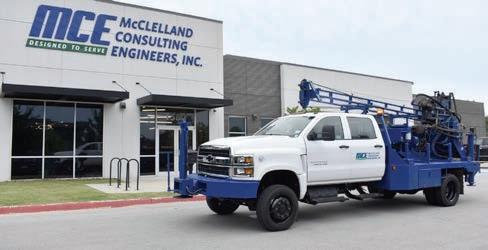
McClelland Consulting Engineers, Inc. is a full-service civil engineering firm that can carry your project from start to finish. We are well-versed in the following types of projects:
• Aquatic Parks & Pools
• Aviation
• Construction Materials Testing
• Construction Observation
• Drainage & Stormwater Management
• Geotechnical Engineering
• Land Development

• Landscape Architecture
• Parks & Recreation
• Sidewalks & Streetscapes
• Site Design
• Survey
• Transportation Engineering
• Water & Wastewater Engineering

by
By Andrew morgan, League staff
The Arkansas Municipal League’s executive committee, officers and other board members met to implement our organization’s policies and goals and strategize for the coming year during the annual planning meeting, held August 14 and 15 in Magnolia, home of new League President, Mayor Parnell Vann. Unfortunately, due to a family emergency, Mayor Vann was unable to attend the executive committee meeting. Nevertheless, his staff and the city stepped up in his absence and were fantastic hosts.
Acting as chair in the absence of the president, Greenwood Mayor Doug Kinslow, first vice president, brought the meeting to order at 9 a.m. on Thursday,
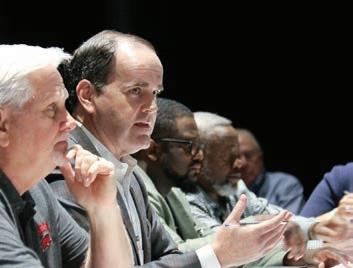

August 15, at the Magnolia Performing Arts Center. After the approval of the minutes from the committee’s May 15 meeting, League Executive Director Mark Hayes presented his annual report, updating the executive committee on the status of the League’s activities and programs and to discuss what the future holds for the League and its member cities and towns.
Following the executive director’s recommendation, the executive committee voted to retain the existing service charge formula for member

Municipal Vehicle Program and Municipal Property Program Director John Wells shares details of the proposed rate changes for the two programs.
cities and towns. The base charge will remain $40 plus 35 cents per capita. Members receive a 7-cent credit per capita for participation in each of the League’s optional benefit programs.

Valerie Shively provides an overview of the 90th Convention and a look ahead at future events, including a new series of legislative roundtables prior to the next session of the Arkansas General Assembly.
The League also has 121 limited-service members, which include counties, housing authorities, waste management districts, volunteer fire departments and other entities. The executive committee voted to retain their existing rates as well. The membership rate for counties is $1,000 and the rate for other municipal entities is $500.
For detailed information on the League service charge, fees associated with optional programs, turnback estimates and the latest APERS multiplier, please refer to the executive director’s budget memo in this issue on page 16.
The meeting also gives program directors and other key staff the chance to discuss the fiscal status of the optional benefit programs, propose any necessary rate changes, set future meeting dates and other business.
See the updated rates for the Municipal Vehicle Program and the Municipal Property Program on page 18. One important agenda item before the executive committee was to review the package of resolutions passed by the membership during the convention’s annual business meeting. Upon the recommendation of League General Counsel and Legislative Director John Wilkerson, who leads the legislative advocacy team, the committee prioritized several of the resolutions in preparation for the 2025 General Assembly. Priority resolutions include:
• A resolution to add “retail” the Arkansas Constitution’s list of economic development projects cities may invest in under Article 12, Section 5.
• A resolution to study ways a portion of the 3% administrative fee charged by the state to collect local sales taxes could be used to assist municipalities.
• A resolution supporting amending statutes governing highway revenue distribution to allow municipalities to spend street fund money for emergency purposes when the need arises. These and other resolutions are in the League’s Policies and Goals 2024-2025, and included as an insert in this issue and available for download at armuni.org/publications
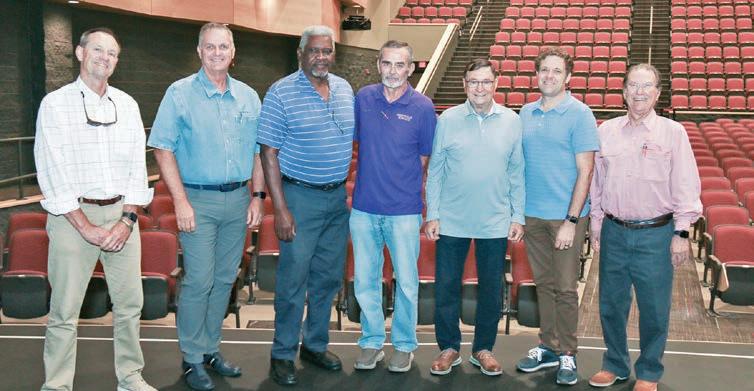

Seven Coalition Partnership Empowerment (COPE) coalitions in Arkansas have been awarded the prestigious Drug-Free Communities (DFC) grant from the Office of National Drug Control Policy, the Arkansas Opioid Recovery Partnership (ARORP) has announced. The seven coalitions were among 13 that, with an initial investment from ARORP of $536,607, attended CADCA’s new Opioid Coalition Academy.
For the seven coalitions receiving the DFC grant, the funding will provide each with $125,000 annually for five years, for a total of $625,000 per coalition and a nearly $4.4 million investment in opioid abatement and recovery efforts in Arkansas cities, towns and counties. Coalitions will also have the opportunity to apply for a second five-year term of funding.
“This is a phenomenal achievement by ARORP, COPE and CADCA, which shows the power of possibilities that we realize in partnership,” said CADCA president and CEO, Major General (Ret.) Barrye L. Price. Coalitions that received DFC funding include:
• Prevention-Awareness-Youth-Support (PAYS) Coalition, Mountain Home, Baxter County
• Sebastian County Opioid Task Force, Fort Smith
• The Opioid Prescription Drug and Synthetics Coalition (O.P.P.S.), Blytheville, Mississippi County
• Newton County Partners in Prevention Coalition, Jasper
• Greene County Mental Health and Substance Abuse Coalition, Paragould
• Amazing Angels Coalition, Lake Village, Chicot County
• Carroll County Hometown Health Coalition, Green Forrest
ARORP’s leadership team and representatives from the coalitions gathered at the Association of Arkansas Counties (AAC) headquarters in Little Rock September 19 to celebrate the announcement of the DFC grants.
“Y’all, this is a party day,” said AAC Executive Director Chris Villines. “This is a day of celebration for what we’ve been able to accomplish at ARORP and what all of you have been able to accomplish across the state.”
ARORP, an initiative of the Arkansas Municipal League and the Association of Arkansas Counties, has taken an evidence-based approach to funding opioid abatement projects across the state by finding gaps in resources and filling them, said League Executive Director Mark Hayes. Unlike less successful efforts in other states, ARORP is transparent in its spending of settlement funds, he said. “We can tell you where every single penny went. We can tell you what that penny is being spent on, and we can quantify it in a way that tells us whether it’s working or not.”
Out of the 13 coalitions ARORP invested in, 10 applied for DFC funding and seven of those were awarded grants. It’s a remarkable achievement that doubled the number of counties in the state with DFC funding, ARORP Director Kirk Lane said. “One thing we put into this program is that these new counties have to mentor another county, so we hope to double it again in 2025. So, if you are looking for funding and you have a heart to abate the opioid epidemic, all you have to do is download the ReviveAR app, go to our website, and you can apply through that process and be successful like these counties were.”
For more information about the Arkansas Opioid Recovery Partnership and to download the ReviveAR app, visit ARORP.org.

By Andrew morgan, League staff
From late September through early October, the Arkansas Municipal League’s legislative advocacy team held a series of roundtables in six cities across the state, where they invited mayors, city managers, city administrators and state legislators from local districts to discuss the League’s legislative priorities ahead of the 2025 General Session of the Arkansas Legislature. Forrest City, Fort Smith, Harrison, Hope, Monticello and Springdale each hosted a stop on the tour, and turnout was strong, with more than 120 cities and towns represented around the table and with more than 20 state legislators joining the conversation.
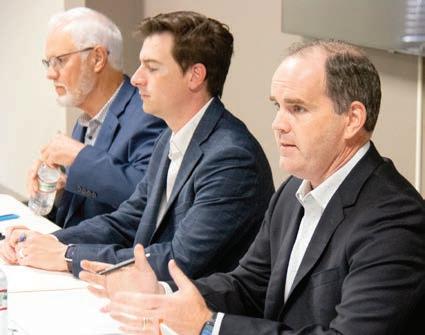
League General Counsel and Legislative Director John Wilkerson, right, and his legislative advocacy teammates Blake Gary, center, and Jack Critcher lead an October 3 roundtable in Monticello, one of a series of events that brought together city and town leaders and legislators to discuss the League’s legislative priorities ahead of the 2025 General Assembly.
we need to focus on maybe finding a way that we can add retail to foster this economic development.”
A July meeting of the Northeast Arkansas Mayors Caucus was the impetus for holding the discussions, League General Counsel and Legislative Director John Wilkerson said. The caucus invited League staff to Paragould to share our legislative priorities with local mayors and legislators, and the conversation was very productive, Wilkerson said. “We realized the value of all sitting down together, breaking bread together, and talking about what’s important to Arkansans.”
During the League’s Annual Planning Meeting in August, the executive committee arranged the resolutions passed by the membership at the 90th Convention in order of priority, and those top issues served as the starting point of the roundtable discussions.
First on the list was the resolution to add “retail” to the list of economic development projects cities may invest in under Article 12, Section 5 of the state constitution. That list includes projects such as industrial facilities, recycling facilities, job training facilities and more. In 2019 state lawmakers added “facilities for the retail sale of goods” to the enacting legislation at A.C.A. § 14-176-102 but did not, in turn, add it to Article 12, Section 5 of the constitution. The legislature could make that change with a three-fourths vote.
“The one thing that’s not in here is retail,” Wilkerson said. “For a lot of you across the state, retail is probably the number one job creator in your city or town. And so, we thought if this were really trying to grow jobs, then
The League’s Blake Gary asked the group to consider the potential benefit to the vast areas of Arkansas outside the more economically robust population hubs. “There’s a lot of rural communities out there that don’t even have a Sonic,” Gary said. “I also know we have a lot of food deserts in the state.” The idea of being able to incentivize a grocery store drew appreciative nods from mayors like Zola Hudson of Altheimer, who has been working with groups like the Arkansas Hunger Relief Alliance for several years to find a way to bring fresh, healthy food to her Delta community.
Another priority resolution offered by the League proposes taking a portion of the cities’ sales tax money kept by the Department of Finance and Administration as a processing fee and using it to fund water projects. Starting in 1977, the state has kept 3% of all local option sales taxes cities and counties collect each year as a processing fee. That now amounts to approximately $31 million per year in local sales taxes that aren’t returned to cities, towns and counties, Wilkerson said.
The League proposes putting half of the amount collected by DFA toward local water system projects through the Arkansas Natural Resources Commission. While it wouldn’t be enough to address the state’s estimated $9 billion in water/wastewater system needs, it would be a great start and it has broad support among the League’s membership. “If we don’t take care of water, nothing else matters,” Springdale Mayor Doug Sprouse said during the September 6 meeting in his city.
Another key issue discussed that will likely appear before the legislature in 2025 includes the ongoing study of the complicated funding mechanisms of the state’s district court system, including the potential to ease cities’ share of that burden. The League would like to see the system funded fully by the state, and Rep. Jeff Wardlaw (Dist. 94) agreed. “I’m going speak, not as chairman of Legislative Council [Committee] but as Jeff Wardlaw, and my support would be to fund it completely. And not only fund it completely, but fund the clerks as well. That’s the number one complaint I’m getting from all the district judges in my district.”
For Wilkerson, the legislative roundtables have been a great success. “They exceeded my expectations, and I was thrilled with the turnout.” He was especially pleased to have the opportunity to engage with leaders from small cities and towns who aren’t necessarily regulars at
the League’s Little Rock meetings but are working hard on these issues back home. “To put faces with names and voices—or faces with text messages—was really amazing.”
Based on the success of the first round of meetings, the League will host another legislative roundtable November 20 at its North Little Rock headquarters. Mayors, city managers, city administrators and legislators are invited to attend. Please visit armuni.org/advocacy for more information, or email events@arml.org
To review these and other resolutions, see the League’s Policies and Goals 2024-2025, included as an insert in this issue and available for download at armuni.org/publications.

Eyeing the 3% the idea of tapping a portion of DFA’s 3% processing fee for collection and remittance of local sales taxes and redirecting for water projects through the AnRC prompted much of the conversation during the October 3 legislative roundtable in monticello.
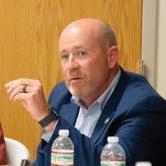

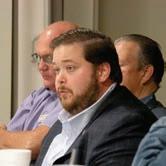
“Every mayor in my part of the state would probably want to participate, but that money would be spread thin,” Rep. Jeff Wardlaw said. “That’s my only concern.”
Eudora has been able to make progress on its water/wastewater needs in recent years, but they “still need all the help that we can get,” Eudora Mayor Tomeka Butler said.
Between regulations and rising labor and construction costs, funding water projects is “killing us as a small town,” DeWitt Mayor James Black said. “We don’t have the budget for that.” The city will likely need to raise water rates just to be able to qualify for grants.

“I’m open to the discussion, but I think we need to look at the whole picture before we start carving any of it out for water,” said Sen. Ben Gilmore (Dist. 1).
The League’s first preference would be lowering the DFA’s 3% processing rate, agreed Crossett Mayor Crystal Marshall, “where those taxpayer dollars go back to the people that pay them. And if that’s not an option, I think my second would be something that would benefit us statewide.”

By Andrew morgan, League staff
For many Arkansas mayors, particularly in small cities and towns with limited resources and staff, the job of being the municipality’s chief executive often goes beyond administrative tasks and the duties set forth in state code. That’s certainly true for Bono Mayor Danny Shaw. “I’m kind of on the front lines, so to speak. I may one day have to carry the trash out and the next day drive a dump truck or build a bridge.”
Before taking public office 10 years ago, Shaw spent 27 years in the moving business. As a young person, he came up in his family’s manufacturing business, where he learned to weld, paint, set up and operate machinery, and even “a little engineering.” All of those skills were put to good use this summer when, after acquiring a batch of pipes from Federal Surplus Property, he built a pedestrian bridge for the city park.
Dear Brian,

Let’s hear how it came about in the mayor’s own words. Earlier this summer, Shaw wrote to Brian Jones, compliance and eligibility manager with the Arkansas Department of Public Safety, Division of Emergency Management, Federal Surplus Property:
Several years ago, maybe 6 or 7, Federal Surplus Property offered some 10” well casing for sale. This pipe was 10” in diameter and had a 3/8” wall, and they were from 40’ to 47’ in length. They were offered for sale at $100 per piece. We made a deal to get 20 pieces and the County Judge was able to send one of his trucks to do the pick-up (at no cost to us). We used most of this for culverts in our new Legacy Park. In places where we needed more drainage volume, we put two pipes side by side. This was a great savings, and it’s a quality of pipe that will last for much longer than corrugated culvert.
We were able to find so many uses for the pipe that sometime later we called to see if more was available. Sure enough, there was some left, and you offered to sell it for $50 per piece if we could take all you had. Once again, the County Judge was able to send his truck for the pick-up (at no cost to us). We took it all and have found so many good uses for it.
The most recent use was to make the main frame on a walk bridge, which I designed and built for our Bono City Park. This bridge is 30’ long and 60” wide. It spans a ditch and makes it possible for people to cross so they may enjoy other areas of the park. We did have to buy new material for the remainder of the bridge build, however the 10” well casing made a very strong main frame, and the savings of dollars would be great. Photos are included.
I hope this is encouragement to other mayors to pay attention to what you have to offer, and take advantage of the possible savings, and remember, stay on good terms with your County Judge.
Yours for a Better Bono,

Danny C. Shaw, Mayor



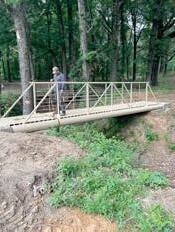


At Swift Recreation, we bring your outdoor visions to life with turnkey solutions that inspire play, learning, and growth Partnering with trusted brands like Little Tikes Commercial, No Fault Surfaces, and Modern Shade, we create safe, inclusive, and innovative spaces where children thrive Quality, safety, and fun are at the heart of everything we do



By mark R. Potter, League staff
Has a vendor or contractor asked your city to change the way they are paid? Did they ask to be paid with an electronic funds transfer or an automated clearing house (ACH) transfer instead of a physical check as originally agreed upon? There is a chance you may be paying an impostor using a technique called phishing.
Phishing is an online scam that targets people, businesses and agencies through messages sent via email, text or direct message that appear to be from a reputable source. Phishing messages commonly ask for personal identifying information that is then used to invade existing accounts. In what is commonly called spear phishing, an attacker may use information about a real company and its employees to make their messages even more persuasive and realistic.
Over the past several years, international scammers have successfully targeted numerous cities using phishing techniques, diverting large payments from city projects. Some of the losses are staggering, and the chances of recovery are almost zero.
In 2020, perpetrators posing as a vendor used phishing, spoofing, social engineering and compromised email accounts to commit wire fraud totaling $445,945.73 meant for an Arlington High School building project.
Cottage Grove, Minnesota: more than $1.2 million2
In 2021, a $3.5 million contract for a sewage treatment project in the city’s south district was finalized with a local company. Over the next three months, almost half of that sum was sent to phishing scammers.
1 https://statescoop.com/massachusetts-town-loses-445000-email-scam/



The city paid $773,695.45 in February 2022 to phishing scammers posing as a local construction company that had existing city contracts. The incident was not made public until June of 2024.
million4
Scammers duped the Florida city out of $1.2 million in September 2023. The city paid the sum after receiving what was believed to be a legitimate invoice from the construction company hired to build a new police station.
The Canadian city is trying to recover more than $1.5 million swindled in 2023 by fraudsters who allegedly infiltrated the email accounts of a construction company contracted to build an affordable housing project.
In 2024, the city intended to pay a contractor hired to work on a wastewater project, but scammers were able to intercept and divert $1,092,519 of the city’s payments.
2 https://ca.news.yahoo.com/heres-city-minnesota-sent-phishing-010338800.html
3 https://wreg.com/news/investigations/city-of-memphis-lost-773k-in-phishing-scam/
4 https://www.usatoday.com/story/news/nation/2023/09/25/scammers-dupe-fort-lauderdale-florida/70959727007/
5 https://www.thestar.com/news/investigations/how-scammers-tricked-a-northern-ontario-city-into-wiring-1-5-million-to-a-toronto/ article_482866d6-bfa7-11ee-a62c-fb332125fdc6.html
6 https://idahonews.com/news/local/city-of-gooding-loses-over-1-million-in-social-engineering-scam
California:
A Fresno County Civil Grand Jury investigation following a phishing attack on the city offers details of how these international organized crime rings target cities.
• Construction began on a new police substation in southeast Fresno in April 2019, according to the grand jury report. The contractor requested to be paid by physical checks.
• The Fresno Finance Department received an email in January 2020 from the perpetrator of the scam who identified as an employee of the construction company. They asked to receive payments through an ACH transfer instead. In the following weeks, the department authorized two electronic payments to the perpetrator totaling $613,737.
• “At no time did the perpetrators submit fraudulent invoices,” the grand jury report said. “It appears they simply scoured the internet for large construction contracts being awarded by local governments. Using real data gleaned from the City Council agendas and minutes, they were able to identify this particular contract, used what information was publicly available, and initiated a successful phishing scheme on unsuspecting city employees.”
• The report revealed city staff failed to pick up on the fraud despite numerous signs. The fraudulent email addresses ended in “.us” while the contractor’s had ended in “.com”, and the scammers gave multiple bank account numbers across different states.
• The city learned about the scam when the construction company threatened to walk off the job over lack of payment.
• The grand jury found that finance department employees had failed to follow policies that would have prevented the fraud. The staff had not authenticated the ACH form to ensure that the “form submitted by the vendor [was] actually from the vendor of record.”
• They had also neglected to have a different staff member review the transfer, a step that was required for all “large disbursements.”
• The grand jury found that the electronic payment procedure was “largely unwritten at the time of the incident.”
• According to the grand jury’s report, “Training for the handling of these important money transfers
was conducted verbally, and it appears that not all Finance Department employees were properly trained.”“Without strict observation and enforcement of new and existing internal controls,” it adds, “there is a high probability of similar losses in the future.”
Now is the time to review your municipal finance department’s policies and to train staff on recognizing phishing scams and the importance of reporting all suspected attacks to your information technology department. Even well-meaning and hard-working staff can be tricked by these sophisticated bad actors. Knowing how to spot the red flags in an email, text or direct message can help stop scammers before they get their hooks in your organization.
1. Check the “From” email address. Make sure to cross-check the email domain on any suspicious email.
2. Watch for misspelling and incorrect grammar. Misspelled words and names, incorrect grammar and strange sentence construction are all red flags.
3. Hyperlinks: Hover, don’t click. If a message includes a hyperlink, don’t immediately click on it. Hover over the link to check if the URL leads to the website you would expect based on the sender.
4. Be wary of attachments. Do not open any attachment until you are absolutely certain the sender is legitimate.
5. Beware of claims of urgency. Rewards or scare tactics are two common phishing approaches that demonstrate a sense of urgency to get you to click faster.
6. Don’t provide personal information. Legitimate companies will never ask for sensitive or personal information over email.
7. Check the time and date.
View with caution any emails that land in your inbox outside of normal business hours.
8. Go with your gut.
Is the email about money or log-in information? Are you sure they are who they say they are? If you have even the smallest gut feeling that the email is not legitimate—even if you can’t exactly articulate why you feel that way—ask your IT team.
7 https://www.fresno.courts.ca.gov/system/files/general/grand-jury-report-3.pdf
email address as communicate with. outside my organization responsibilities someone inside the vendor, or partner character. a suspicious micorsoft-support.com)?
email with an attachment from with recently.

or more people, but I don’t it was sent to. sent to an unusual mix of people random group of people at my start with the same letter, or a whole
• I don’t recognize the sender’s email address as someone I ordinarily communicate with
• This email is from someone outside my organization and it’s not related to my job responsibilities
• This email was sent from someone inside the organization or from a customer, vendor, or partner and is very unusual or out of character
• Is the sender’s email address from a suspicious domain (like micorsoft-support.com)?
• I don’t know the sender personally and they were not vouched for by someone I trust.
• I don’t have a business relationship nor any past communications with the sender.
• This is an unexpected or unusual email with an embedded hyperlink or an attachment from someone I haven’t communicated with recently.
that’s displayed in the email message, but different website. (This is a big red flag.)
• Did I receive get during regular was sent at an
•
• Is the email message I never sent

• The sender included an email attachment that I makes no sense in relation to the email message. ordinarily send me this type of attachment.)
• I see an attachment with a possibly dangerous that is always safe to click on is a .txt file.
• Did I receive an email that I normally would get during regular business hours, but it was sent at an unusual time like 3 a.m.?
• Did I get an email with a subject line that is irrelevant or does not match the message content?
• Is the email message a reply to something I never sent or requested?
• Is the sender asking me to click on a link or open an attachment consequence or to gain something of value?
• I was cc’d on an email sent to one or more people, but I don’t personally know the other people it was sent to.
long hyperlinks with no further information, completely blank.
• I received an email that was also sent to an unusual mix of people For instance, it might be sent to a random group of people at my organization whose last names start with the same letter, or a whole list of unrelated addresses.
hyperlink that is a misspelling of a known web site. For www.bankofarnerica.com — the “m” is really two characters — “r” and “n.”
• I hover my mouse over a hyperlink that’s displayed in the email message, but the link-to address is for a different website. (This is a big red flag.)
Other product and company names mentioned trademarks of their respective companies.
• I received an email that only has long hyperlinks with no further information, and the rest of the email is completely blank.
• I received an email with a hyperlink that is a misspelling of a known web site. For instance, www.bankofarnerica.com — the “m” is really two characters — “r” and “n.”
• Is the email out of the ordinary, or does it have bad grammar
• Is the sender asking me to click a link or open up an attachment
• The sender included an email attachment that I was not expecting or that makes no sense in relation to the email message. (This sender doesn’t ordinarily send me this type of attachment.)
• I see an attachment with a possibly dangerous file type. The only file type that is always safe to click on is a .txt file.
• Do I have an uncomfortable gut feeling about the sender’s or click a link?
• Is the email asking me to look at a compromising or embarrassing someone I know?
• Is the sender asking me to click on a link or open an attachment to avoid a negative consequence or to gain something of value?
• Is the email out of the ordinary, or does it have bad grammar or spelling errors?
• Is the sender asking me to click a link or open up an attachment that seems odd or illogical?
• Do I have an uncomfortable gut feeling about the sender’s request to open an attachment or click a link?
• Is the email asking me to look at a compromising or embarrassing picture of myself or someone I know?




DOWNTOWN ROGERS WATER & SEWER MASTER PLAN
DOWNTOWN ROGERS FARMER’S MARKET


By nathan Eberline
Earlier this year my daughter, Grace, read Watership Down. I had previously encountered references to the book, but I had not taken the time to read it. In the introduction the author, Richard Adams, explained the likely reason why. Publisher after publisher initially rejected his book with this explanation: It is too serious for young children, and older children won’t read a book about rabbits. Those publishers were wrong.
Adams crafted a novel that went on to win numerous awards and eventually joined the ranks of classic children’s literature. Throughout the book, it struck me that the richness of the characters and their personalities provided meaningful insight into humanity and the way we interact with an important lesson in local government.
One character description stood out for its clarity and thoughtfulness. The character Bigwig is as his name describes. He is a large rabbit with a tuft of hair atop his head. The leader of the rabbit colony, Hazel, offered the insight that Bigwig “was probably going to be troublesome. He was certainly no coward, but he was likely to remain steady only as long as he could see his way clear and be sure of what to do. To him, perplexity was worse than danger; and when he was perplexed he usually grew angry.”
of anger as a signal that something is wrong. The issue, however, is what we do with that signal.
In his recent book, The Spirit of Our Politics, Michael Wear offers this observation: “Our political system intentionally and methodically cultivates anger. Political activists, academics and politicians testify to the usefulness of anger in our politics. Studies have shown anger can motivate political behavior, and the scientific ratification of that fact lends all the sanction that many people who have power need, in response, to stoke anger.”
Consider for a moment how well known it is that we can manipulate people in their anger. There are few ways to more quickly bring people onto your team than to affirm and kindle someone’s anger toward a common enemy. So it is no surprise that we see this approach of spurring outrage on the news, from our politicians and even in our individual conversations about politics.
“By choosing kindness and empathy over anger and division, we can begin to transform our political discourse.”
It struck me in the moment and strikes me now how true this reality is for many of us, particularly in the field of politics. As the 2024 presidential election draws near, I find myself thinking about how often confusion leads to anger and why this emotion continues growing in prevalence.
On one hand, anger is a natural response to circumstances. Plato, who knew a bit about politics, observed that anger is a natural response when people think they are wronged. They “instantly boil and chafe” until correcting the injustice. In this sense, we can think
But just as the leaders in Watership Down were wary over anger, we should hold a similar posture. We should see our way clearly and remember that anything done in anger can be done better without it. Not only is it in the public interest to pursue reason and self-control over anger, but it for our individual good. Augustine of Hippo, in his Letter 38 (A.D. 397), notes how anger, particularly anger that extends from a sense of being in the right, “permeates within, until the whole is soured, and the vessel itself is spoiled.” And what is true for the individual is true for the community.
Each of us carries a responsibility in our circle of influence. The circle may not be as large as a national politician’s, but the influence is no less valuable or significant. Speaking with rage, disrespect or even annoyance normalizes the corroding nature of anger. The citizenry is watching whether we appreciate it or not. It may not show up broadly, but the nature of our words will affect the way others think and talk about all
levels of government. It is a responsibility we cannot take lightly.
Rather than holding onto the impulse of anger when we have been wronged or witness injustice, we can choose to emulate Hazel, the wise leader from Watership Down. Over and again, he demonstrated a calm and thoughtful leadership, even in the most challenging situations. Hazel and his community modeled the mindset that they would rather succeed in doing what they can, rather than fail to do what they cannot. This idea is an important reminder that progress often comes in small steps, not grand leaps. By focusing on achievable goals and building upon existing strengths, we can create a more effective and civil political climate.
Despite this aspirational vision, the complexities of modern politics make it easy to overlook leadership like Hazel’s quiet and reflective voice. It is far easier to be like Bigwig: perplexed and angry. But embracing the impulse of anger is rarely, if ever, the template for sound governance. If we can instead respond wisely to the confusion and frustration by remembering how much we all have in common, then we are far more likely to find the practical solutions that will help improve our communities.
We may long for broad, sweeping changes to improve the nature of our politics and government. Yet sometimes the smallest reminders—like those found in children’s books—can reshape our perspective. By choosing kindness and empathy over anger and division, we can begin to transform our political discourse. It may not be the far-reaching changes we desire, but starting where we are and trading anger for joy in the small moments may provide the best opportunity to reach a meaningful destination in the years to come.

Nathan Eberline is executive director of the League of Kansas Municipalities. He can be reached at neberline@lkm.org
This article appeared originally in the September/October 2024 issue of Kansas Government Journal, the official magazine of the League of Kansas Municipalities, and is reprinted with permission.



(501) 688 - 8800 MitchellWilliamsLaw.com
The executive committee of the Arkansas Municipal League (AML) voted in 2012 to award two scholarships for registration to the AML Winter Conference. A scholarship will be awarded to one mayor or council member, and to one city clerk, recorder or treasurer, which will enable city officials to further their educational training in municipal government.
The Arkansas City Clerks, Recorders, and Treasurers Association (ACCRTA) agreed to manage applications and the selection process.
Completed scholarship applications should be returned to the ACCRTA Scholarship Committee chair: Penny Lamb, CMC, CAMC, CMO Recorder/Treasurer
City of Murfreesboro 805 N. Washington Ave. Murfreesboro, AR 71958
Direct questions to murfreesboroclerk@yahoo.com, 870-285-3732 work or 870-285-5000 cell
Name:
Title:
Mailing Address: Telephone:
City, State, Zip: Email:
Municipality:
Date you assumed your present position:
Related experience: Title Municipality Years
How much does your municipality budget annually for your department for education? Does your municipality pay or reimburse travel and meal expense? ☐ yes ☐ no
What is your approximate cost to attend the AML Winter Conference (including tuition, lodging, meals and transportation): $
What is your reason for applying for this scholarship?
I, , am a member of the Arkansas Municipal League, and do hereby apply for registration assistance from AML (applicant’s city or town must be a member of AML at the time of application.) I understand that if a scholarship is awarded to me, it must be used for registration at the AML Winter Conference to be held January 15-17, 2025, at the Statehouse Convention Center in Little Rock and that I must attend all sessions. If my attendance must be approved by the chief executive officer or legislative body of my city or town, I will be given time to attend the conference. I do hereby attest that the information submitted with this application is true and correct to the best of my knowledge.
Signature:
Date:
Disclaimer: ACCRTA is not responsible for applications that do not reach the chairperson by the deadline. Please feel free to call or email for verification of receipt.
Invites all mayors, council members, police and fire departments, and other municipal employees to join us for:

Your participation in our No Shave November campaign will support APCF’s range of statewide services by raising much-needed money and awareness.


January 15-17, 2025 | Statehouse Convention Center, Little Rock For more information, contact events@arml.org.
at events.arml.org.
Preparations are in full swing for Called to Serve: ’25 Winter Conference, taking place January 15-17, 2025, in Little Rock. With more than 500 attendees already registered, this conference looks to be the most impactful one yet. Join us for this incredible opportunity to connect, learn and celebrate with municipal leaders from across Arkansas!
Called to Serve: ’25 will welcome newly elected and veteran officials to the Arkansas Municipal League, share actionable solutions for pressing local issues, foster meaningful discussions among municipal leaders and offer an array of educational opportunities for members. The conference will also provide a preview of the upcoming General Session of the Arkansas Legislature, and members will have a chance to visit with lawmakers from around the state.
The conference will kick off on Wednesday, January 15, with a keynote address from Doug Griffiths, founder of 13 Ways Inc. and author of 13 Ways to Kill Your Community. Known for his refreshingly candid approach to community development, Griffiths will address common pitfalls that can hold cities and towns back and offer practical, empowering solutions to help them thrive.
Breakout sessions will be available for both experienced leaders and newly elected officials. Newly elected officials will find sessions tailored to reinforce the ACE Hub Level 1 Civilpedia courses covering the basics of municipal government, municipal finance, human resources, planning and zoning, and the Freedom of Information Act. Returning attendees who have mastered the Civilpedia may attend multiple professional development, cybersecurity, grants and disaster preparedness breakouts.
The Arkansas City Attorneys Association will host a series of CLE-accredited sessions January 16-17 for city attorneys and legal professionals.
Celebrate community achievements at the Arkansas Business Trendsetter City Awards and the Engage AR Volunteer Community of the Year Awards.
Winter Conference registration is for in-person attendees only. However, both breakout sessions and general sessions will be recorded and added to the ACE Hub, the League’s learning management system. Conference attendees will receive a coupon code to access these sessions on the ACE Hub for 90 days post-conference at no additional cost. Members not able to attend in person may purchase individual session credits at $20 per class on the ACE Hub. As demand for virtual attendance has decreased and audio/visual costs have risen, the League has focused on expanding the ACE Hub for on-demand, remote learning.
Take advantage of the ACE Program, a self-paced learning platform that currently offers over 50 on-demand credits. Level 1 Civilpedia covers the essentials of municipal government, municipal finance, human resources, planning and zoning, and FOIA. You can find a portion of the 2024 Annual Convention breakouts, a disaster preparedness course, a grant-writing series and many more certification credit opportunities available. With more than 1,000 users already engaged, the ACE Hub is an ideal supplement for continued training and certification.
As our Exhibition Hall continues to grow in popularity, and becoming a sponsor is the best way to secure a prime booth location. Act fast to reserve your spot! For sponsor and exhibitor details, visit events.arml.org or email vshively@arml.org.
Wednesday, January 15
1 p.m.-5 p.m. Check-in & Exhibition Hall open
3 p.m.-4:30 p.m.
General Session 1: Opening Ceremony & Keynote
5 p.m. Happy Hour
6 p.m.-8 p.m. Dinner
8 p.m. Dessert Reception
Thursday, January 16
7:30 a.m.-5 p.m. Check-in & Exhibition Hall open
7:30 a.m.-8:45 a.m. Breakfast
8 a.m.-5 p.m. ACAA CLE
9 a.m.-10:15 a.m. General Session 2
10:30 a.m.-11:20 a.m. First Round Breakout Sessions
12 p.m.-1:30 p.m.
Trendsetter City and Volunteer Community of the Year Awards Luncheon
2 p.m.- 3:30 p.m. Second Round Breakout Sessions
4 p.m.- 5 p.m.
General Session 3
Dinner on your own
Friday, January 17
8 a.m.-5 p.m. ACAA CLE
8 a.m.-10 a.m. Inspire Breakfast
Attendees on the road by 10:30 a.m.

By tracey L. Cline-Pew and Caleb Alexander-mcKinzie, League staff
On April 23 of this year, the Department of Labor released its final rule regarding overtime pay under the Fair Labor Standards Act (FLSA). The new rule raised the salary threshold of exempt employees. The new rules also created a timeline where the salary thresholds will be raised again on January 1, 2025, and will be reevaluated every three years to keep wages on par with cost-of-living and national wage data. You may be thinking, “That’s great, but what does that really mean for my city?” Great question! Let’s look at what the new rules mean for municipal employers.
First, the words “salary” and “exempt” are not synonyms. The most common mistake that employers make is assuming that if an employee is paid on any kind of salary basis, they are exempt and do not have to be paid overtime. This is wrong. Being a salaried employee and being an exempt employee are two very different things. Being a salaried employee simply refers to the methodology used to compensate an employee and, while it plays a role in determining whether an employee is classified as exempt or non-exempt pursuant to the FLSA, it is not the only factor. Think of it this way: At some point, you probably heard your math or geometry teacher say something along the lines of “all squares are rectangles, but not all rectangles are squares.” Sound familiar? That same logic can be applied here. All exempt employees are salaried, but not all salaried employees are exempt. So, for the purposes of this article, let’s put aside how an employee is paid for now, and discuss what makes an employee exempt or non-exempt.
Overtime pay or compensatory time must be paid at a rate of 1 1/2 times a non-exempt employee’s regular hourly rate for time worked over 40 hours in a defined work week. Overtime or compensatory time is based on hours actually worked by an employee. Paid time off, vacation time, holidays, comp time used and sick time are not included in the calculation of overtime. Unless the employees are properly classified as exempt and meet certain FLSA requirements, employers have a legal duty to pay overtime for hours actually worked over 40 hours in a work week.
It is important to note that elected municipal officials are excluded from coverage under the FLSA (29 C.F.R. § 553.11), so the minimum salary threshold does not apply. Put simply, elected officials are not considered municipal employees.
The three most common types of exemptions found in most cities and towns are executive, administrative and professional. There are specific guidelines that must be met in these three categories for an employee to be classified as exempt.
To be exempt from overtime, executive employees must meet all of the following FLSA requirements:
1. The employee must be compensated on a salary basis at a rate not less than $844 per week1; and
2. The employee’s primary duty must be managing the enterprise in which the employee is employed or managing a customarily recognized department or subdivision of the enterprise; and
3. The employee must customarily and regularly direct the work of two or more other full-time employees or their equivalent; and
4. The employee must have the authority to hire or fire other employees, or the employee’s suggestions and recommendations as to the hiring, firing, advancement, promotion or any other change of status of other employees are given particular weight (29 C.F.R. § 541.100).
If an employee does not meet each provision outlined above, they do not qualify for the executive exemption and must be compensated for overtime unless another exemption applies.
To be exempt from overtime, administrative employees must meet all the following FLSA requirements:
1. The employee must be compensated on a salary or fee basis at a rate of not less than $844 per week exclusive of board, lodging or other facilities; and
2. The employee’s primary duty is the performance of office or non-manual work directly related to the management or general business operations of the employer or the employer’s customers; and
3. The employee’s primary duty includes the exercise of discretion and independent judgment with respect to matters of significance (29 C.F.R. § 541.200).
If an employee does not meet each provision outlined above, they do not qualify for the administrative
1 Remember, the threshold for all categories is being raised again January 1, 2025.
exemption and must be compensated for over overtime unless another exemption applies.
It is important to note that just because an employee has the word “administrative” in their title, it does not mean that they are exempt from overtime under the administrative exemption. Administrative in this sense of the word refers to employees who work independently and have the authority to make final decisions on matters of consequence and significance to your organization without the approval of anyone else in authority. For example, administrative assistants would not qualify in most instances—they assist the administrator but are not administrators themselves.
The term “employee employed in a bona fide professional capacity” in section 13(a)(1) of the Act shall mean any employee:
1. Compensated on a salary or fee basis at a rate of not less than $844 per week exclusive of board, lodging or other facilities; and
2. Whose primary duty is the performance of work:
• Requiring knowledge of an advanced type in a field of science or learning customarily acquired by a prolonged course of specialized intellectual instruction; or
• Requiring invention, imagination, originality or talent in a recognized field of artistic or creative endeavor (29 C.F.R. § 541.300).
Examples would be attorneys, engineers, doctors, CPAs, etc.
If an employee does not meet each provision outlined above, they do not qualify for the professional exemption and must be compensated for overtime unless another exemption applies.
Cities and towns are not required to give an employee who is in an exempt position a raise to meet the minimum salary threshold. In fact, in many instances this is not possible due to budgetary restrictions. However, if the minimum salary threshold is not met, the employee must be re-classified as non-exempt and paid for time worked over 40 hours in a defined work week at the rate of 1 1/2 times the employee’s regular hourly rate or given compensatory time at the same rate.
If you are re-classifying employees as hourly but you want to calculate a base salary for them, this formula may be helpful: (base pay x 40) + ((base pay x 1.5) x
(hours worked over 40 hours)) = salary. Keep in mind that the employee’s pay will fluctuate depending on the number of hours they work. These employees are not exempt, so if they regularly work 50 hours a week but happen to work 52 hours during a specific pay period, you are responsible for adjusting their pay to reflect the two extra hours worked in that period. It is worth your while to look at your employee handbook and ensure that you have a policy in place to make sure overtime is authorized by a supervisor before the overtime is worked.
As mentioned above, the minimum salary threshold is scheduled to increase to $1,128 per week ($58,656 annually) effective January 1, 2025, so even if you have exempt employees who currently meet the minimum salary threshold, you will need to re-evaluate their status at the beginning of the new year. The time to begin planning for the next increase is now. Consider implementing a time-keeping system to accurately track employee hours, and reallocate job assignments so that employees do not need to work over 40 hours per week. Or, as you plan your 2025 budgets, consider including funds for overtime where appropriate. There are many strategies that can be implemented.
When the new FLSA minimum salary threshold was announced, there was speculation that lawsuits would be filed to keep it from going into effect. This has not happened in Arkansas, and all indications point to guidelines and new thresholds going into effect as proposed.
For more information on the FLSA, including discussion of exemptions not covered in this article, please refer to the League’s publication, “The Fair Labor Standards Act: 21 Things You Should Know” available on the Publications page of the League’s website, www.armunileague.org. And as always, if you have any questions or concerns, we are here to help and welcome your calls and emails.


Tracey L. Cline-Pew, SPHR, SHRM-SCP, is chief human resources officer for the Arkansas Municipal League. Email Tracey at tpew@arml.org , or call 501-374-3484 ext. 111.
Caleb Alexander-McKinzie is legal and inquiry counsel for the Arkansas Municipal League. Email Caleb at calexander@arml.org , or call 501-978-6132.
P.O. Box 38 North Little Rock, AR 72115-0038
Arkansas Municipal League
P.O. Box 38, North Little Rock, AR 72115-0038
Mark R. Hayes
P.O. Box 38, North Little Rock, AR 72115-0038
Andrew Morgan
P.O. Box 38, North Little Rock, AR 72115-0038















By Jim von tungeln
Questions arise these days over the so-called “ownership” of land, particularly when parts of said ownership move from the private to the public sectors. This piece looks at a few of the issues.
Our Arkansas Constitution, Article 2 - Declaration of Rights states: “The right of property is before and higher than any constitutional sanction; and private property shall not be taken, appropriated or damaged for public use, without just compensation therefor.”
Simple? Sort of. The word “property” lacks a definition. Also, there has been some discussion over the years about the selection of the term “public use” as opposed to “public purpose.”
The winner is “use,” at least so far.
Despite rhetorical mythology, we don’t actually “own” land. In the U.S., attorneys tell us, one can only own rights to land, not the land itself. Ownership of rights is never unassailable because the state’s various public entities retain the right of eminent domain.
As for what one has control over, the so-called “bundle of rights” includes: the right of possession, the right of control, the right of exclusion, the right of enjoyment and the right of disposition.
The question, from an urban planning perspective, then becomes, how do some, or even all, of these rights
transfer from the private to the public sectors? The ways include:
• Fee simple, or outright purchase of all rights. For example, the public typically owns all rights to the property whereupon sits the city hall or its fire stations.
• Easements, or the grant of a nonpossessory property interest that provides the easement holder permission to use another person’s land.
• Dedications, or the transfer of privately owned land in the form of an easement to serve the public.
These definitions provide a general description to be used only with legal oversight. The question for planners and elected officials is: Who maintains properties affected by any of the above? For example, that question arises frequently these days with regard to detention and retention ponds dedicated for flood control. It also arises in cases of so-called “private streets.”
Let us concentrate on those two.
Dedications for drainage are a recent phenomenon. Unfortunately, many cities paid scant attention to the issue of drainage until the passage of the National Flood Insurance Program (NFIP), administered by the Federal Emergency Management Agency (FEMA).
by
Now cities are reviewing and approving subdivision plats that provide ponds designed to slow or hold floodwaters that threaten developed areas. Aptly named detention and retention ponds, they can provide a level of safety when well designed and are not simply the dedication of unusable land.
The question then often becomes: Who assumes the responsibility of such impoundment areas once they become part of an approved subdivision plat?
An immediate answer might be the developer. That sounds good, but developers have been known to, in the words of Huck Finn, “light out for the territories” once the last profitable lot is sold.
Another answer might be the property owners association (POA). Perhaps, but in our state, as an experienced city engineer for a highly regarded city quipped, “POAs are too often ‘Here today. Gone tomorrow.’”
One city surveyed is considering improvement districts as a way to address such problems. This is a method by which a group of property owners can share the cost of infrastructure improvements through levies on their property taxes. State legislation governs improvement districts and municipal involvement requires substantial legal oversight.
Some cities simply accept the fact that the only dependable method of permanent maintenance rests with the city. Compensation for this service will also depend on substantial legal oversight. It might even require new legislation.
Other transfers of private rights include the dedication of open space, a common requirement of planned unit development (PUD) regulations. Also, the state planning statutes allow plats to reflect the reservation for future public acquisition of land for community or public facilities indicated in the plan (emphasis added.) Again, who assumes responsibility for maintaining such reservations?
If this sounds complicated, that is because it is. The city should rely on professional assistance and legal guidance in dealing with such elements of land use regulation.
The maintenance of streets represents a more familiar aspect of development regulation. If development regulations meet the provisions of A.C.A. § 14-56-417, the regulations “shall establish the procedure to be followed to secure plat, approval by the [planning] commission.”
Once the planning commission approves a plat, knowledgeable attorneys offer the opinion that the city has responsibility for the dedicated portions of the plat. What about a plat that requests that streets are private elements for which the POA will assume responsibility? This frees the city, forever, from any maintenance worries.
As an Ernest Hemingway character once said, “isn’t it pretty to think so?”
Actually, approval of “private streets” initiates myriad complexities, a major one being perpetual maintenance. Fire trucks will weigh more than 75,000 pounds whether the city or property owners assume maintenance responsibility for the streets. What happens if there is a fire 20 years from now?
The collective experience of professional urban planners surveyed for this piece is a brutal one. They agree that what we call private streets are often ones that do not meet minimum standards set by the city for street construction. In other words, they save money initially for subdivision construction.
In practice, they are called “private” only until the first major maintenance comes due. Not one planner interviewed recalled an instance where private streets remained the responsibility of property owners over time. Ultimately, the perpetual cost to the taxpayers greatly exceeds the initial savings to homeowners. Such considerations have led many cities to consider the life-cycle costs of subdivision approval.
Development regulations should reflect this. Planners, along with city engineers, recommend that all streets used by the public, or to provide public services, be built to municipal standards at a minimum. This will provide some relief to the city budget when the city does resume responsibility.
This all suggests that the city pay close attention to the bill of assurance (BOA) that the development regulations will mandate. This document, filed with the plat, “gives birth to and serves as constitution for, the subdivision” in the words of one real estate professional. The city should carefully inspect the BOA for what it expects of the subdivision and maintenance of improvements.
The question is, are there uncovered items for which maintenance is not mandated? If so, the taxpayers will eventually own it. Anticipating this, one city surveyed now requires a maintenance plan for any retention or detention ponds within a subdivision. That is called “protecting the citizens.”
A final word on ownership bears mentioning. If a city chooses to engage in the planning function, it should agree to “own” planning itself. This includes providing competent professional management and trained planning commissioners. It also includes maintaining up-to-date materials that reflect current legislation and judicial decisions.
Will that cost? Yes. How much? Figure somewhere between the annual cost of holiday decorations and the cost of a nasty legal battle involving a planning decision.

Jim von Tungeln is staff planning consultant and available for consultation as a service of the Arkansas Municipal League. He is a member of the American Institute of Certified Planners. Persons having comments or questions may reach him at 501-944-3649. His email is uplan@swbell.net
By tabatha Duvall
Community branding is more than a marketing strategy, it’s a vital component to shaping a community’s identity and it drives economic development activity. As cities and towns look to enhance their appeal and foster growth, branding initia tives have become a critical tool. Community branding involves creating a unique identity for a place that encompasses the community’s image and values that distinguish it from other localities.
Effective branding plays a crucial role in economic development by attracting investment, enhancing local business growth and boosting community pride. A welldefined brand establishes a good first impression, boosts existing local business by increasing visibility, and fosters a sense of pride and belonging among residents.

Pea Ridge is a small, dynamic northwest Arkansas city known for its military history and its location along a high ridge in the Ozarks. Located in the fastest growing region in the state, Pea Ridge has a promising economic outlook. The city recently embarked on a new branding initiative with the University of Central Arkansas (UCA) Center for Community and Economic Development (CCED) and Thrive, Inc., a Helena-West Helena based nonprofit that helps rural communities reach economic goals through rebranding, placemaking initiatives and engaging youth.
The goal of the branding process is to capitalize on the current economic growth in northwest Arkansas and define what makes Pea Ridge unique. “By undergoing this process, we are hoping to show that our city is a city of great opportunity for business, residential and economic growth,” Mayor Nathan See said. “We are moving forward and growing not only in population, but also growing our local economy.”
In partnership with UCA and Thrive, Pea Ridge has developed a new city logo and brand. The process was highly inclusive, involving community meetings and a committee of residents that worked hand-in-hand
Pea Ridge’s new logo is the result of community input and incorporates elements of the city’s history and geography.
to design the new brand. When Mayor See convened a brand leadership committee, he was intentional in his recruitment. The committee included a local graphic designer, native residents and new residents.
The new design concept incorporates elements of Pea Ridge’s history and geography. The overall diamond shape was chosen to be representative of the Arkansas state flag. The pea leaves bring to mind the native plants for which pioneer settlers named the community. The ridge itself is represented in the shape of the hills, and the star hearkens back to the Civil War history of the Battle of Pea Ridge. The colors were chosen to represent the natural beauty of the Ozarks in and surrounding the city.
In addition to the new logo, the city has adopted the tagline, “Life is Better on the Ridge,” sharing the pride they share in their community’s quality of life.
The community has already started to embrace the new look. Shirts and hats are available for purchase at city hall, new “Welcome to Pea Ridge” signs are in production, and the city’s vehicle fleet and website are being updated to include the new logo and tagline.

To measure the success of the branding initiative, the city will be tracking several indicators, and regular community feedback will also be crucial in assessing the brand’s impact.
Mayor See added, “I will be watching how the community comes to like the logo more and more; I have heard some say it has a look of growth and opportunity, we are a staple in northwest Arkansas, and that Pea Ridge is a healthy community.”
As Pea Ridge moves forward with its branding efforts, other communities looking to enhance their own
economic landscapes may take cues from this initiative. Exploring branding consultations with organizations like Thrive could offer valuable insights and strategies to harness the transformative effects of a community brand.

Tabatha Duvall, PCED, is assistant director of the Center for Community and Economic Development at the University of Central Arkansas. Contact Tabatha at tduvall4@uca.edu or 501-852-2930.
By tiffany Atkins Howell, Ph.D.
There’s no doubt that children are growing up in a digital world, with cellphones, tablets and other devices usually within easy reach. The extent to which this is helping or hurting them, however, is still a matter of debate.
Research has demonstrated that social media can distract tweens and teens from completing homework and other responsibilities. It can spread misinformation and rumors, expose them to cyberbullying and cause body image problems. In the most dangerous cases, it can expose children to online predators or violence.
On the other hand, forbidding screen time can lead to isolation and social ostracization. Research has also revealed some beneficial aspects of technology, such as its ability to encourage self-expression and creativity and to foster a sense of connection and support, especially among marginalized groups.
Navigating this digital landscape can be just as confusing for parents as it is for their children. That’s why I’d like to take a closer look at the challenges of social media and the steps you can take to protect your children’s well-being.
In my clinical work with tweens and teens, I’ve seen that social media can distort their sense of reality in several ways. One problem involves the photo “filters” that allow users to adjust their hair and eye color, smooth out blemishes and manipulate image backgrounds. These edited images cause many youths to judge their own appearance more harshly or to believe that the lives of their peers are more glamorous than they truly are.
The constant stream of information from social media also prevents children from enjoying the old adage that “ignorance is bliss.” Tweens and teens routinely post pictures of themselves with their friend groups, peers and significant others. For those who aren’t invited to a particular outing, dinner or sleepover, their exclusion becomes apparent when they see the photos online. This can make them feel unwanted or unimportant.
Another issue I commonly encounter is the almost unrestricted access that teens have to each another. Through cellphones and social media, they’re able to remain in contact at all hours of the day and night. In
the best-case scenario, these are positive interactions between friends, though they can ultimately interrupt sleep or time spent with family. In the worst-case scenario, these interactions might involve a tween or teen who is subject to bullying from a peer.
While these are serious areas of concern, we can’t dismiss social media’s role in the lives of young people. So how do we reap the benefits while minimizing the risks?
Guidelines from the World Health Organization and the American Academy of Pediatrics call for no screen time among children ages 18 months to 24 months, except for video-chatting, and for no more than an hour a day among children from 2 to 5 years old. Experts recommend that tweens and teens not be allowed to have phones or tablets in their bedrooms overnight.
It’s important that you communicate with your children to establish healthy boundaries around when screens are allowed and for how long. If you need to ensure compliance, then there are many tools that can help. For example, some apps offer features that allow them to be shut off automatically after a specified time limit.
You should also take precautions to restrict harmful content. Most devices have the ability to restrict materials based on age level, as well as features that monitor what users are viewing. Having frequent conversations with your children about what they’re watching will also help ensure that the content is age appropriate.
Lastly, but perhaps most importantly, it is imperative that caregivers serve as role models for what healthy screen time looks like. When you put down the phone while interacting with your children, engage in activities where screen time is not allowed, or set your own online restrictions, you’ll remind them that there’s much more to life than what they can see on social media.

Tiffany Atkins Howell, Ph.D., is an associate professor in the University of Arkansas for Medical Sciences (UAMS) College of Medicine and a psychologist at the UAMS James L. Dennis Developmental Center.















By Anna Claire Vocque and madison Swears
Pickleball has swiftly become the fastest-growing sport in America, experiencing an astonishing 223.5% increase in participation since 2020.
Recognizing this trend and the potential to enhance community well-being, the city of Maumelle sought to leverage its COVID-19 relief funds for a transformative recreational project. The goal was to create an outdoor facility that would provide a safe and engaging space for residents to enjoy physical activity during a time when many traditional recreational options were limited. Mayor Caleb Norris organized a pickleball bash to assess the level of interest, and the significant turnout only emphasized the growing enthusiasm for the sport. The success of this event highlighted the need for dedicated facilities and set the stage for the development of the pickleball complex.
The selected site for the pickleball complex is an area adjacent to the Jess Odom Community Center, aquatic center and skate park. Previously occupied by
abandoned tennis courts before becoming a hub for unregulated drop-offs and pick-ups for nearby schools, the location was characterized by its safety hazards and aesthetic neglect. The transformation of this underutilized space into a vibrant pickleball complex was a strategic decision aimed at revitalizing the area and integrating the new facility with existing recreational amenities. The project not only addressed the safety and aesthetic concerns but also provided an opportunity to expand the recreational offerings available to residents, contributing to a more dynamic and inclusive community space.
With the constraints of a one-time grant, the city desired a facility that would stand the test of time while minimizing ongoing maintenance costs. The design features seven post-tensioned pickleball courts, shade structures and lighting. A low-maintenance landscaping plan was developed to reduce the need for irrigation, and a detention pond was included to manage stormwater
runoff effectively. The site is also ADA-accessible, incorporating improvements to the Maumelle Trail System to enhance connectivity and accessibility. The proximity of the community center, which houses Maumelle Parks and Recreation, allows for convenient monitoring and integration of the facility into the center’s existing operations, ensuring minimal impact on staffing and budget.
The incorporation of post-tensioned concrete for the courts was a key innovation, chosen for its durability and resistance to cracking, a feature that ensures play surfaces remain high quality with limited maintenance. The selection of a hardy, low-maintenance landscape plan further demonstrates the project’s commitment to sustainability, eliminating the need for irrigation and aligning with environmental considerations. The integration of the complex with the existing Maumelle Trail System improved accessibility and enhanced connectivity between different recreational areas. These innovative design choices reflect a forward-thinking approach that balances functionality, aesthetics and long-term sustainability, setting a new standard for recreational facility development.
Design work commenced in October 2023 and construction began in November 2023. The project reached completion in May 2024, coming in under budget, with
Pickleball Complex has received an overwhelmingly positive response from the community, with residents embracing the opportunity to enjoy outdoor recreation in a newly revitalized space. The rapid sale of over 100 access keys within the first 36 hours of opening highlights the strong demand and enthusiasm for pickleball in this community. The project’s success extends to local schools, which have expressed interest in hosting youth leagues and tournaments, further integrating the facility into community life.
The Maumelle Pickleball Complex is a prime example of how engineering can drive positive change in community infrastructure. By transforming an underused and neglected space into a vibrant recreational facility, the project highlights the role of engineers in repurposing existing infrastructure to meet evolving community needs. The project not only enhances the recreational options available to residents but also sets a precedent for future initiatives that prioritize both functionality and community impact.
Madison Sanders is a marketing coordinator and Anna Claire Vocque is a project designer, and they work in MCE’s Little Rock office. They can be reached by phone at 501-371-0272.

$3,514,392.30 supplemental for July 2024
The print version of City & Town is now a quarterly magazine, but you’ll never have to miss a month of your latest local sales tax receipts. The latest reports for cities, towns and counties from the Arkansas Department of Finance and Administration and each month’s turnback estimates are available on the League’s website. Go to armuni.org/publications and click on “Local Option Sales and Use Tax in Arkansas” to access the information you need, when you need it.
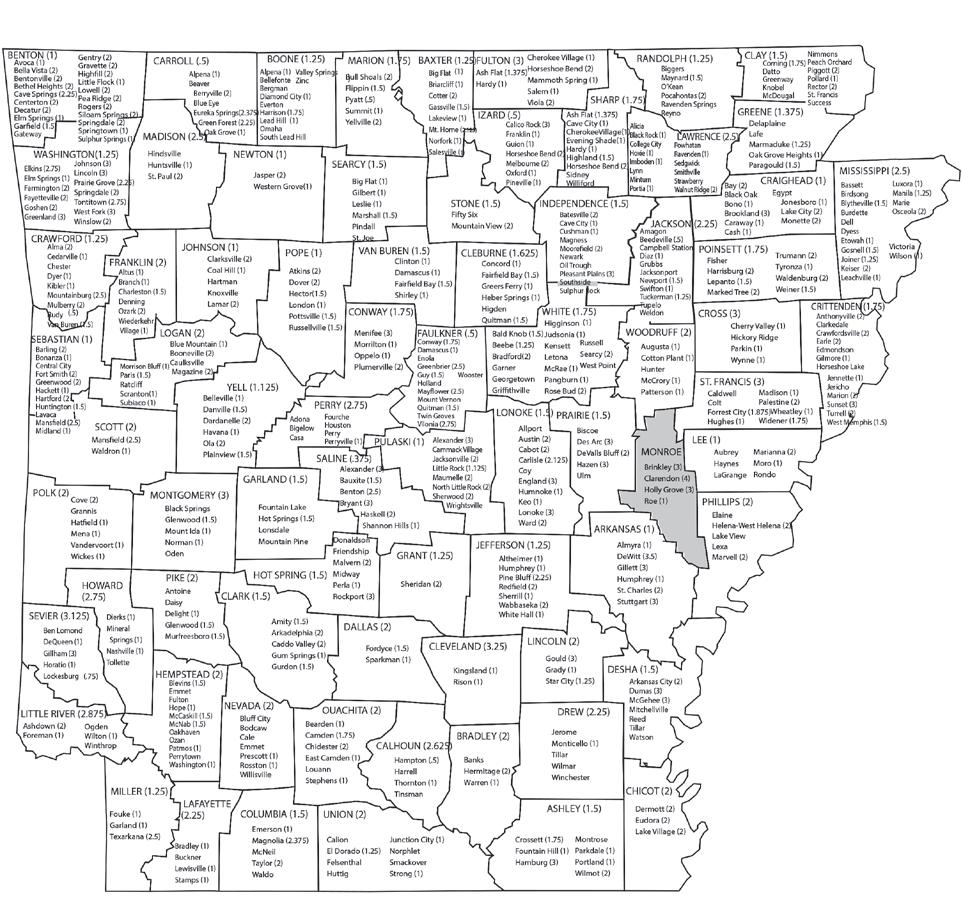
Source: Rachel Garrett, Office of State treasurer See also: www.dfa.arkansas.gov
Cotter
Morrison
Mount
Mountain
Mountain
Monette
Moorefield
Mount
Mountain
Mountainburg 16,581.36
Mulberry 39,457.29
Norman 4,784.29
North Little
Oak Grove 1,365.37 Oak Grove Heights 9,529.00
Parkin 5,389.99
Rector 38,068.04
Redfield 43,845.96
Rison 21,151.32
Rison 19,718.74
Rockport 38,220.23
Rockport 34,259.03
Roe 841.82
Roe 1,197.20
Rogers 5,250,144.14
Rogers 4,910,920.87
Rose Bud 33,064.61
Rose Bud 24,804.20
Rosston 4,021.45
Rosston 3,069.40
Rudy 13,057.26
Rudy 15,145.82
Russellville 1,368,785.31
Russellville 1,347,305.49
Salem 31,569.12
Salem 32,760.63
Salesville 5,999.72
Salesville 5,501.08
Scranton 5,239.43
Scranton 5,347.81
Searcy 1,530,098.68
Searcy 1,135,867.40
Shannon Hills 19,001.30
Shannon Hills 17,742.10
Sheridan 328,332.88
Sheridan 321,845.94
Sherrill 812.11
Sherrill 1,010.91
Sherwood 1,417,926.43
Sherwood 1,275,229.38
Shirley 4,610.00
Shirley 4,317.47
Siloam Springs 1,029,058.21
Siloam Springs 1,003,943.18
Sparkman 4,688.26
Sparkman 5,231.96
Springdale 4,325,201.92
Springdale 4,106,231.62
Springtown 438.18
Springtown 262.64
St. Charles 3,495.83
St. Charles 3,133.19
St. Paul 4,115.60
St. Paul 3,883.13
Stamps 15,437.14
Stamps 14,478.20
Star City 52,055.85
Star City 59,512.04
Stephens 5,716.95
Stephens 5,391.66
Strong 11,893.32
Strong 9,818.75
Stuttgart 706,750.47
Stuttgart 707,924.85
Subiaco 7,237.87
Subiaco 9,848.39
Sulphur Springs 7,724.15
Sulphur Springs 4,422.66
Summit 5,757.81
Summit 6,862.94
Sunset 9,087.62
Sunset 6,036.14
Swifton 7,081.00
Swifton 6,548.70
Taylor 13,383.08
Taylor 9,449.33
Texarkana 582,716.95
Texarkana 593,570.80
Texarkana Special 269,266.40
Thornton 1,198.64
Tontitown 468,812.08 Trumann 220,823.94 Tuckerman 15,130.70 Turrell 4,978.38 Tyronza 5,323.67 Van Buren 746,894.67 Vandervoort 575.71
Vandervoort 3,696.84
To place a classified ad in City & Town, please email the League at citytown@arml.org or call 501-374-3484. Classified ads are FREE to League members and will run for two consecutive months from the date of receipt unless otherwise notified. FOR NON-MEMBERS, classifieds are available for the rate of $0.70 per word and will run for one month unless otherwise notified. Once we receive the ad, we will send an invoice. The ad will run once payment is received.
ACCOUNTANT—The city of Osceola is currently accepting applications for the position of city accountant. Interested persons should submit an application to the Human Resources Department. This posting will remain open until the position is filled. The incumbent assists the mayor, chief operating officer, human resource director and electric department director in providing financial and accounting services for the city. The incumbent is responsible for performing technical and administrative professional accounting work in maintaining the fiscal records and systems of the city. The job objective is to ensure financials, grants, bonds and other special program accounts are reconciled, balanced and maintained in accordance with established policies and procedures. Qualified applicants must possess a bachelor’s degree from an accredited college or university with a major in accounting or related area and have two to four years of experience in accounting, management reporting or auditing in a Generally Accepted Accounting Principles (GAAP) or Government Accounting Standards Board (GASB) environment. Certified Public Accountant (CPA), Certified Public Finance Officer (CPFO) or Certified Government Financial Manager (CGFM) preferred. Annual salary $55,000-$67,000. To apply, you must submit a city of Osceola application. Visit osceolaarkansas.com to apply or email jstanford@osceolaar.gov to request an application. Resumes will not be accepted without an accompanying application. EOE and drug free workplace.
ASSISTANT POLICE CHIEF—The City of Judsonia is seeking a highly qualified and motivated individual for the position of assistant police chief. The Judsonia Police Department works to maintain high standards of community respect and has excellent working relationships with other local, state and federal law enforcement agencies. The assistant police chief works under the administrative direction of the police chief and is responsible for work of considerable difficulty in directing the overall operations of the police department. Minimum qualifications: Applicants must hold a certification as a state or national law enforcement officer. Applicants must have a minimum of 5 years of related experience to include 3 years of experience in a supervisory capacity. Benefits: The city values its employees and offers a competitive salary, excellent benefits, 7 paid holidays annually, 15 days of annual vacation leave, 20 days of sick leave, city-paid family health, life and dental insurance, and a LOPFI retirement system. Salary range: based on experience, education and training. Applications will be accepted until position is filled. Applicants should stop by Judsonia City Hall and pick up an application at 318 Van Buren, or email cityof_judsonia@yahoo.com to request an application and return in a sealed envelope.
BUILDING INSPECTOR—The city of Centerton is currently accepting applications for the position of building inspector. Will perform inspections to assure that all new residential and commercial construction and facilities conform to all building codes, municipal codes, and those existing structures, properties and facilities and their uses. Must obtain state Plumbing and HVAC Inspectors License within one year under the guidance of the Chief Building Official/Inspector Jurisdiction. Electrical Inspector license requirement, currently licensed as an Arkansas Electrical Inspector or can currently meet qualifications by state board of electrical examiners and obtain an Arkansas Electrical Inspector License. Job responsibilities are subject to change as deemed by the chief building official/inspector. We are an Equal Opportunity Employer. All qualified applicants will receive consideration for employment. To apply or request an application please email our Human Resources Dept. at careers@centertonar.us or visit www.centertonar.us/employment-opportunities You may also contact us directly at 479-795-2750 ext. 104.
CODE ENFORCEMENT OFFICER—The town of Menifee seeks a part-time code enforcement officer. The position shall perform code enforcement work as it relates to the town’s planning commission. Duties will include enforcing town of Menifee codes and related ordinances. A detailed job description is available on the town’s website, or call Menifee City Hall at 501-354-0898 ext. 1 or 2 with questions. Starting salary will be $15 per hour.
DIRECTOR OF FINANCE— The city of Mount Pleasant, Texas, is looking for an experienced director of finance to lead the city’s financial team and ensure financial stability. Primary areas of responsibility include accounting, utility billing, forecasting, debt management and investments, as well as establishing strong financial practices and transition to a new ERP system. Five years of experience plus three years supervising team members is required. Bachelor’s degree is required and master’s degree and/or CPA preferred. Competitive salary and benefits package DOQ. To apply for this position: www.dcmunicipalconsulting.com
ECONOMIC DEVELOPMENT DIRECTOR—The city of Mexico, Missouri, is accepting applications for an economic development director. Position implements and maintains a program for the continuing establishment and refinement of plans for economic growth and development for the city. Prepares reports on the various phases of economic development. Meets prospective industrial and business relocation or development clients and provides requested promotional information concerning the community. Provides business recruitment and retention services, prepares/maintains agreements and contracts for economic development, identifies infrastructure and planning needs, and assists with workforce planning. Provides development assistance to MainStreet Mexico for revitalization of the downtown district. Degree in public administration, business administration or related field. Three years’ experience in industrial promotion or economic development required. Salary commensurate with education and experience, plus excellent benefit package. Application and job description located at www.mexicomissouri.net. Submit application along with supporting documents to humanresources@mexicomissouri.net. Applications accepted until position filled. EOE/AA/E-Verify/Tobacco and Drug free workplace.
FINANCE DIRECTOR— The city of Searcy is seeking a dynamic and experienced individual to serve as its finance director. This key leadership position will oversee all financial operations and provide strategic guidance to ensure the fiscal health and stability of the city. The finance director will work closely with city officials, department heads and external stakeholders to manage budgets, financial reporting and long-term financial planning. Candidates should have a broad knowledge of such fields as advanced accounting, business administration, finance, etc. Bachelor’s degree from a four-year college or university and six years of related experience and/or training, or equivalent combination of education and experience is necessary. The city of Searcy offers a retirement plan, 100% paid health insurance, paid holidays (including your birthday), paid vacation and sick days, grade pay scale, and longevity bonuses. Visit CityofSearcy.org/human-resources to download an application.
FINANCE DIRECTOR— The city of Lowell seeks a skilled director of finance to oversee all financial aspects of our city. The ideal candidate will be responsible for financial planning, analysis and reporting to drive the city’s financial strategy and improve overall performance. Responsibilities: conduct cash flow analysis and fiscal management to optimize financial resources; ensure compliance with accounting standards such as GAAP, GASB and other regulatory requirements; manage risk by implementing effective internal controls and risk management strategies; lead financial management activities including cost accounting, budgeting and forecasting; prepare accurate and timely financial statements for internal and external stakeholders, including city council meetings; collaborate with the accounting team to maintain accurate records and accounts.
Requirements: bachelor’s degree in finance, accounting or related field, MBA or CPA preferred; proven experience in financial leadership roles with a strong background in public accounting; in-depth knowledge of financial principles, practices and regulations; excellent analytical skills with the ability to interpret complex financial data; strong communication and interpersonal abilities to liaise with various stakeholders; proficiency in financial statement preparation and analysis. Pay: from $80,000 per year plus benefits package. For complete job description please visitwww.indeed.com/job/finance-director-d45f40d14348b88f Resumes can be emailed to drichard@lowellarkansas.gov and mhouston@lowellarkansas.gov
FINANCE OFFICER—Clarksville Connected Utilities is now accepting applications through November 13 for a finance officer. The finance officer (controller) is a key part of the senior management team directing the organization’s financial planning and accounting practices, having a broad knowledge of accounting, business administration and finance. The candidate has the responsibility of reporting financial trends and performance indicators of the utility to the general manager and commissioners. This individual must perform general ledger entries, cash management, tax reporting, analysis and financial statement preparation in compliance with GAAP standards and is the key contact for the external review of auditors. Education and experience: bachelor’s degree in accounting, finance or related field; eight to 10 years accounting experience including five years in a senior level management position; must be able to multi-task and have a working knowledge of Microsoft Word, Excel and accounting software. CPA/MBA preferred. Subject to background/credit check. CCU is locally owned and operated with excellent pay and benefits. CCU is an Equal Opportunity, Drug Free Workplace. Applications may be picked up/dropped off at the CCU Business Office, 400 W. Main St., Clarksville, AR, 8 a.m. to 5 p.m. M-F; or online at https://www.clarksvilleconnected.net/; or email: debbie.pintado@clarksvilleconnected.net
LOSS CONTROL LIAISON—The Arkansas Municipal League is seeking a loss control liaison. Duties include analyzing risk data to develop loss control strategies for Municipal League Workers’ Compensation Program (MLWCP) members; developing and updating safety policies; working with MLWCP members to promote a commitment to loss control and workplace safety; responding to significant loss events identified by the MLWCP director including assisting in the investigation, analysis and implementation of corrective measures; conducting field inspections and providing safety and loss control consultation; and workplace safety training for MLWCP members. A bachelor’s degree from an accredited college or university and seven years of safety-related experience is required. Must be able to obtain Approved Professional Safety Source certification from the Arkansas Workers’ Compensation Commission within one year of employment. Certified Safety Professional or Occupational Hygiene and Safety Technician certification preferred. An employee must live in a city or incorporated town limit to work for the League. Competitive salary BOE and excellent benefits. To obtain a complete job description or to apply, please contact Tracey L. Cline-Pew at tpew@arml.org
POLICE CHIEF—The city of Camden is seeking a highly qualified and motivated individual for the position of police chief. The chief’s duties include planning, directing and controlling all administrative and technical police services and activities along with supervising and providing for departmental training, assignments and discipline. The Camden Police Department works to maintain high standards of community respect and has excellent working relationships with other local, state and federal law enforcement agencies. The police chief works under the administrative direction of the mayor and is responsible for work of considerable difficulty in directing the overall operations of the police department. Minimum qualifications: Applicants must hold a certification as a state or national law enforcement officer. Applicants must have a minimum of 10 years of related experience to include five years of experience in a supervisory capacity. Qualified applicants should possess a minimum of an associate’s degree or its equivalent in related training hours. Benefits: The city values its employees and offers a competitive salary, excellent fringe benefits, an annual uniform allowance, 12 paid holidays annually, 15 days of annual vacation leave, 20 days of sick leave annually, city-paid health, life, and dental insurance, and a state-operated retirement system. Salary range: based on experience, education and training. Closing date: Wednesday, Oct. 8. Applicants should submit a resume and cover letter to the Camden Police Department C/O Chief Carpenter, #1 Police Drive, Camden, AR 71701; or by email at rcarpenter@camdenpolice.com. For questions, please call 870-837-5505 or email assistantmayor@cityofcamdenar.com. The city of Camden is an EOE.
POLICE CHIEF—The city of Oppelo is taking applications for a F/T police chief. Salary at this time is $36,000/year. Health insurance after 60 days and LOPFI retirement. For more information or for application, please call 501-354-2454, email oppelocityhall@tcworks.net, or you may come by Oppelo City Hall at 8 Municipal Drive, Monday-Friday, 7:30 a.m.-4 p.m.
WATER TREATMENT PLANT SUPERINTENDENT—The city of Greenwood has an opening for a FT water treatment plant superintendent. Qualifications must include a bachelor’s degree or equivalent; or 10 years related experience and/or training in water treatment; or equivalent combination of education and experience. This position oversees the water treatment plant by supervising maintenance, construction and repair, including but not limited to pipes, pumps, mixers, tanks, filters, electrical generators, sludge disposal and all water treatment systems. This position works directly under the supervision of the water distribution director. Applications are available online at www.greenwoodar.org or may be picked up 8 a.m.-5 p.m. M-F at Greenwood City Hall, 30 Bell Road. Further questions, please contact HR Director Danielle Smith at 479-357-1132 or dsmith@gwark.com. Open until filled. EOE.
WATER UTILITIES OFFICE MANAGER—The city of Batesville is seeking candidates for the position of water utilities office manager. The office manager is responsible for overseeing the day-to-day administrative operations of the department. This position requires strong organizational skills, attention to detail and excellent communication abilities. The office manager will work closely with the utilities manager/city engineer and other staff to ensure efficient and effective operations. The annual salary will be based on education and qualifications and range between $45,000 and $60,000. Salary package also includes APERS retirement, health insurance at a low cost to employee, access to credit union and other supplement insurances. Additional employee benefits are accrued vacation and sick leave, and 13 paid holidays. A job description and application may be found at www.batesvillearkansas.gov. Please submit applications/resumes to: City of Batesville, Utilities Office Manager Applicant, 500 E. Main Street, Batesville, AR 72501. Resumes may also be emailed to mayorassistant@batesvillearkansas.gov and will be accepted until October 31.

Raymond James is a proven partner for issuers across the U.S. –and those right here in Arkansas.
Our team has a long history of serving the Arkansas public sector we can trace back to 1931, when T.J. Raney & Sons opened its doors. A history that continued when we became Morgan Keegan and then joined forces with Raymond James. And through
all that time, our commitment to our clients and to the communities across our state has only grown, helping us become one of the top 10* underwriters in the country – and the only top 10 national firm in Arkansas.
Put our unique combination of local history and national strength to work for you.
ARKANSAS PUBLIC FINANCE
Cheryl Schluterman // Patricia Quinn // Sam Nagel
Chuck Ellingsworth // James E. Birdwell III // Chad Myers


For nearly nine decades, the Arkansas Municipal League has been a tireless supporter of the cities and towns that make Arkansas a wonderful place to live and work. Stephens has been there from the beginning, providing the nancing and investment advice that have enabled our great municipalities to thrive.